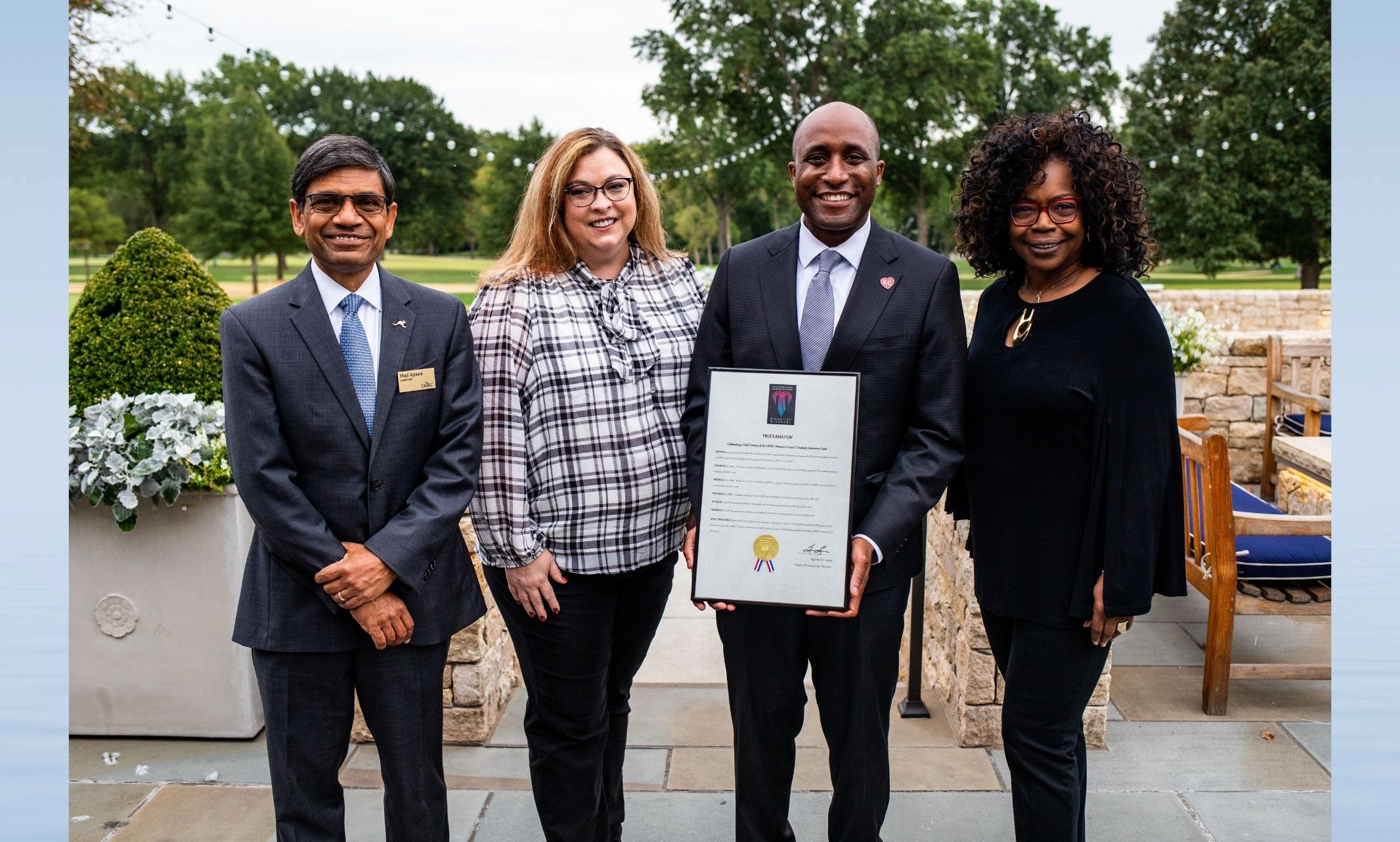
Group adds two new grants, thanks to generous donors, partners
For 50 years The University of Missouri – Kansas City Women’s Council has worked to change the lives of women through the Graduate Assistance Fund.
Established in 1970 with a gift of $750, the UMKC Women’s Council Graduate Assistance Fund has come a long way. As the group wraps up its 50th anniversary year, members have raised more than $50,000 and added several new named awards, or grants, to provide additional support to female graduate students.
As the year comes to a close, the Women’s Council is encouraging supporters to finish out the year strong by contributing to a final giving campaign. There is still time to celebrate the hard work of so many women over the past 50 years, and to support the future potential of many graduate students to come.
Every year the UMKC Women’s Council’s Graduate Assistance Fund awards grants to enable post-baccalaureate students to pursue educational opportunities. The group now has more than 125 named awards, which are named after those who have made a $10,000 investment in the Graduate Assistance Fund, or GAF, endowment. This generosity has helped provide financial support to women graduate students, who have used the money to fund study abroad trips, research endeavors and more, to significantly enhance and enable their educational experience and careers.
“We are proud to have supported thousands of women over the years on their paths to success. With this year’s expansion of the fund, we will be able to help even more women realize their true potential," said Debbie Brooks, former board president, UMKC Women's Council. "The GAF has become a labor of love for those involved and we’ve received incredible feedback from our recipients, the future leaders and innovators studying at UMKC."
On Oct. 5, 2021 Kansas City Mayor Quinton Lucas presented the Women’s Council with a proclamation to recognize 50 years of the Graduate Assistance Fund. He ended the presentation saying, “Here’s to another 50 years and all of your outstanding work!”
As the GAF 50th anniversary year comes to a close, the group hopes for a strong end to a memorable year. The group relies on donations to continue its mission as an organization of women supporting women in the Kansas City community. Contributions help the Women’s Council increase awareness, connect with new donors and further grow the Graduate Assistance Fund. For the 2021 year, donors who take the standard tax deduction, can write off up to $300 in cash charitable donations ($600 for married filing jointly).
“We are helping women graduate students achieve incredible things they might not have had the chance to experience otherwise. Any contribution tells UMKC that this is a very important resource to its women graduate students,” Leslie Boe, J.D., President and Programs Chair, Women’s Council.
Donate here
Learn More About GAF
Dec 22, 2021
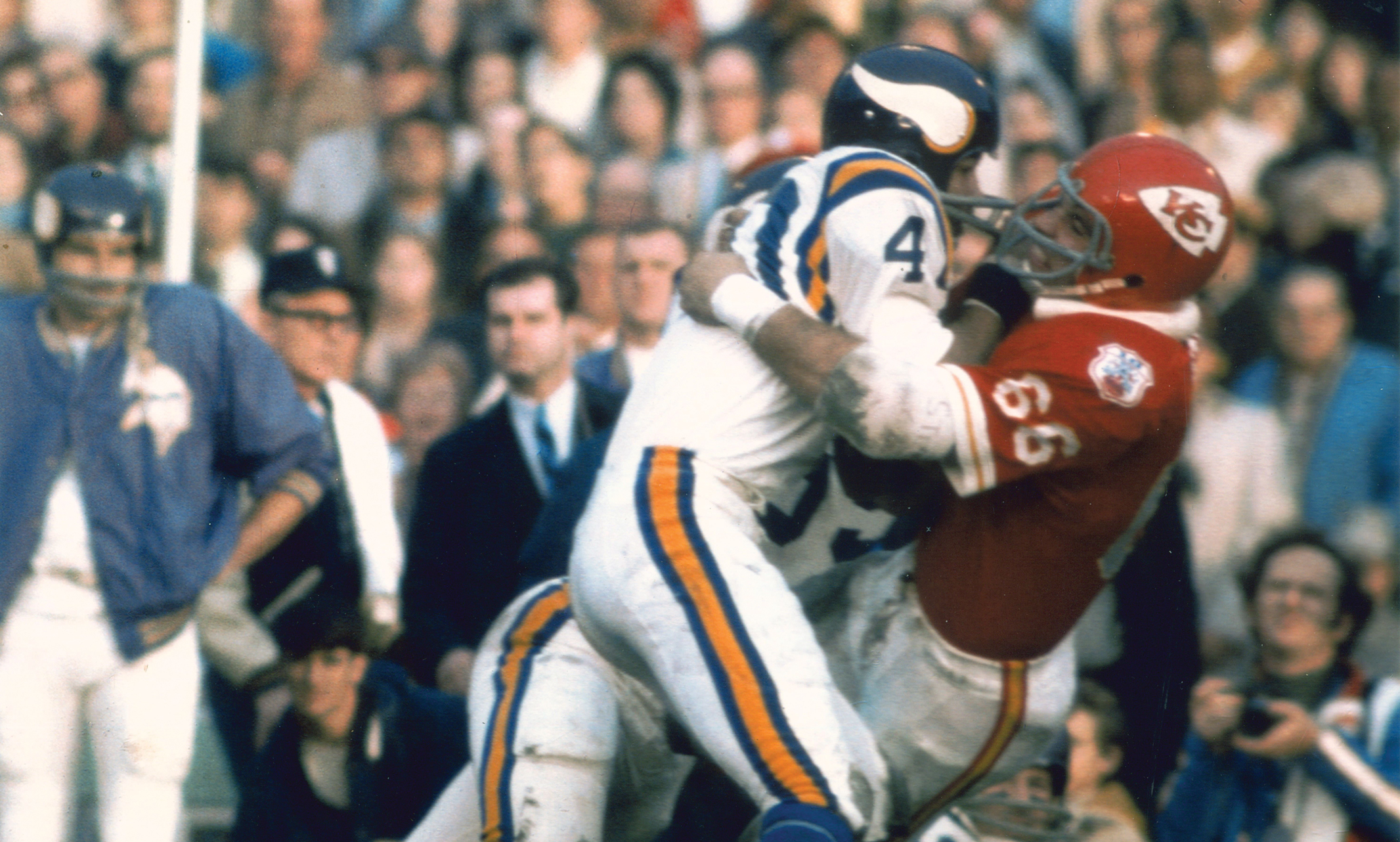
How Bob Stein (J.D. ’73) balanced full-time legal studies with playing for the Kansas City Chiefs — and became a hall of famer
While a full-time law student at UMKC, Bob Stein (J.D. ’73) had to split his time with another major endeavor: playing professional football with the Kansas City Chiefs.
In 1970, the 21-year-old Stein became the youngest ever player at the time to compete in a Super Bowl. Three years later he graduated in the top 10% of his class at UMKC Law. Following his NFL career, Stein became a successful sports attorney and served as the first president and CEO of the NBA’s Minnesota Timberwolves. In 2020, he was inducted into the National Football Foundation College Football Hall of Fame. We sat down with Stein to reflect on a truly unique career.
You’ve had a great career in sports. How did law school fit into all that?
I’d been raised in a home where education was a priority. When I went to college, I intended to be a doctor, but I happened to have a constitutional law class from Professor Harold Chase, who was a brilliant, fascinating guy. I asked him to be my advisor and that got me thinking of law. I thought that whatever I ended up doing, if I had a law degree, it would be helpful and could apply to anything.
It must have been a real challenge to play professional football and attend law school at the same time.
There were a lot of folks who had full-time jobs. It wasn’t like I was doing anything heroic – I had a full-time job playing football. I remember we had one student who was an FBI agent. Other people had families. To me, having kids and all their demands and any kind of a job was more of a demand than playing football. What was really nice about it was that it balanced something that was really intellectual with the really physical “every day’s a day out with the boys” part of football. I always liked living in both worlds.
Do you stay in touch with the people you went to law school with?
Absolutely! One who I’ve stayed in touch with for years is Don Fehr (J.D. ’73), who’s been so prominent in NHL and MLB labor organizations. He’s terrific. When my daughter was in seventh grade, he let her interview him for an hour for a class project. Who does that? At the time he was executive director of the Major League Baseball Players Association. My point is there were a lot of quality people in my class. Another of the classmates I stay in touch with is Jerry Bressel (J.D. ’72), a prominent family law attorney in Kansas City, as is Mark Reza (J.D. ’75).
How was the transition to full-time law practice?
When my football career ended, I really thought the transition to full-time law practice would be a breeze. Boy, was I wrong! The idea that, “I’m going to be able to fool around with the boys for a few months, and then I’ll come back and be a lawyer” was gone. It was a real shock.
One of the things (Chiefs head coach) Hank Stram said that I didn’t think of a lot at the time was, “You’re not a “football player; you’re a person who plays football. You have a family life. You have to develop a professional life apart from football.” For a coach whose livelihood depends on a team’s success and is under such high pressure as a professional coach, that was very unusual and admirable.
Tell us a little bit about your practice life.
I started out intending to do anything but become a sports lawyer. Then, my first year fully out of football, one of my former teammates Ed White called me. Ed was a Pro Bowl-level guard who ended up playing 17 years. I didn’t know anything about athlete representation, but before long, that’s what I was doing! The case was one of those that had a real high profile and turned out well. Soon I was representing other players.
What keeps you busy these days?
I still practice, mostly around the class actions of retired players. In 2009, I started the first class action on behalf of retired players regarding their name and likeness. The case ended up creating the first benefits for vision and dental care for NFL retired players. I really went through the wringer there — learning class actions. Also, for three years, I’ve worked with Lisa Marie Riggins, whose husband is John Riggins, a Super Bowl MVP and Hall of Fame player from Kansas. We started a group called FAIR – “Fairness to Athletes in Retirement” – to advocate on behalf on the players who played before free agency in 1993. We were able to triple the “legacy benefit” pension for those players.
Dec 21, 2021
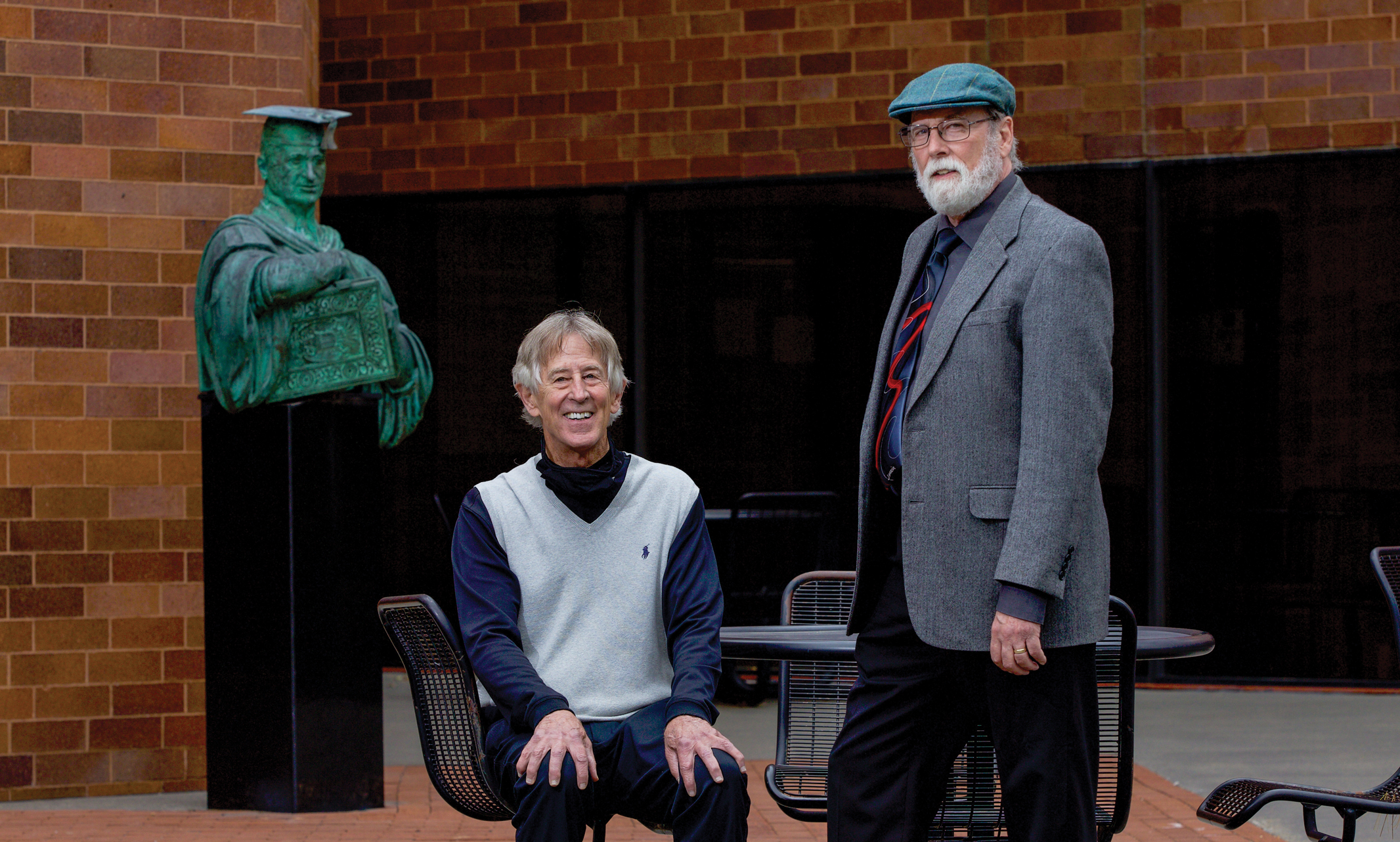
Two UMKC Law professors are reaching major milestones this year
John Ragsdale, William P. Borland Scholar and Professor of Law
John Ragsdale (LL.M. ’72) is celebrating his 50th year of teaching at UMKC. During the past half-century, he’s seen huge shifts in his specialty, environmental law.
“I spent all my formative years hiking and kayaking, climbing in the mountains,” Ragsdale says. “I got out of school in 1970, which is really when the environmental revolution began. Richard Nixon passed the Clean Air Act and Endangered Species Act (in 1973), so that was the heart of it. This sort of tide of environmentalism wasn’t something that had existed yet.”
In 1971, Ragsdale began teaching at UMKC. Over the years he taught a variety of subjects, but his interest in the environment always came back. He saw an opportunity to make an impact.
“I wrote things on environmental law that convinced me there were large-scale problems, and they weren’t yet being addressed,” Ragsdale says.
When asked what he loves about teaching, Ragsdale shies away from the image of a stern professor at the lectern. He says he enjoys when students challenge his views in class, because it shows they care deeply about the issue.
“This is why I really love to teach,” he says. “I teach to talk to people, but it’s less to educate them than to do my presentation of what I know, what I think is important, and elicit what they think is important, too. It has to be a conversation.”
As for what’s next for Ragsdale, he’s hoping it’s more of the same. Environmental law has changed so much over the years, but he’s still finding environmental problems that aren’t being addressed and hoping to fix those problems even 50 years later.
Professor John Ragsdale (LL.M. ’72) began teaching at UMKC in 1971, making this his 50th year in the classroom.
“I have an article that’s coming out this month. It’s on Aboriginal rights to land and water. It leads into a lot of current dilemmas, and the intersection of tribal rights and the ever-encroaching, ever inexorable growth society that’s nibbling away at them at all times. That’s still going on.”
And of course, he’s hoping he’ll continue to teach as long as he can, specifically here at UMKC. Professor Ragsdale is himself an alumnus of UMKC Law, earning his LL.M. in 1972. “God, I love this place. It’s been my home. It’s been my life. I love teaching, and I want to keep doing it. It has been exactly what I want to do. I would ask myself, ‘Would you rather be a judge? Would you rather teach at Yale?’ No. UMKC is my home, intellectually.”
“I love this place. It’s been my home. It’s been my life. I love teaching, and I want to keep doing it.” — John Ragsdale, William P. Borland Scholar and Professor of Law
Sean O’Brien, Professor of Law
Sean O’Brien (J.D. ’80) is not only a professor of the UMKC School of Law, but he’s also an alumnus. He graduated in 1980 with plans to be a tax and business lawyer. He quickly discovered that wasn’t his calling and joined the public defender’s office in 1981. Three years later, he was appointed the chief public defender in Jackson County.
"I did my first death penalty case in 1983,” he says. “And I’ve been doing mostly death penalty work since then. It’s a long time, and I’m still absorbing that. In a lot of cases and a lot of projects that we do in our daily lives, we say, ‘OK, that’s good enough.’ It’s hard to be good enough when life is at stake. It’s quite a burden, and I’m still not sure what it feels like not to have that burden.”
Professor Sean O’Brien (J.D. ’80) is entering a new season in his career following nearly four decades as a death penalty defense attorney.
For the first time in 38 years, O’Brien does not have a client on death row. The case he just finished took 12 years to reach a decision; another before that took 20. Given the average length of cases of this nature, O’Brien feels it’s time for another season in his career.
“I realize I don’t still want to be doing this when I’m 80. I shouldn’t still be doing this when I’m 80. I don’t want to be that lawyer who gets famous for falling asleep in court, you know? It’s time for me to let other people continue to do the work.”
For decades, O’Brien has been doing just that: helping other people to continue what he started.
Since 1983, he has served as director of various criminal defense clinics at the UMKC School of Law, including the Public Defender Appeals Clinic, the Public Defender Trial Clinic and the Death Penalty Representation Clinic. In 2005, O’Brien began teaching at UMKC as a doctrinal professor of criminal law and procedure. He’s taught multiple criminal procedure courses, as well as courses on fact investigation and another specialized course on mental health investigations.
“As far as I know, we’re the only law school in the region, if not the country, that offers a for-credit class in investigation,” he says. “It’s a delight to do.”
“I realize I don’t still want to be doing this when I’m 80. … It’s time for me to let other people continue to do the work.” — Sean O'Brien (J.D. '80), Professor of Law
As for what comes next for O’Brien, he has some plans. He’s determined to create even more opportunities for students to carry on the work to which he’s dedicated more than half his life.
“I’m thinking about creating a sentencing mitigation clinic that would focus on representing people who are in prison for lengthy terms that are applying for parole … because we’re not going to solve the problem of mass incarceration by cherry-picking innocence cases,” he says. “We won’t reject cases because you’re not worthy, you’re not innocent enough or we don’t think we can prove you’re innocent. I’m working across campus with other professors who are interested in that.”
Dec 21, 2021

When opportunity calls, these alumni don’t shy away from a new challenge
Ask any seasoned professional if they’re still doing what they thought they would be doing in college, and you’ll likely hear stories of unexpected pivots, discoveries and transitions (sometimes several times over).
That adaptability is one of the lessons students learn while at the School of Law — how to continue learning and growing after graduation, even if it takes them outside their predicted career path. These are the stories of three UMKC alumni who stayed open to new opportunities, igniting new passions and interests along the way.
Tim McNamara (J.D. ’80), Chief Legal Officer, BKD, LLP
Tim McNamara (J.D. ’80) has always loved being in the midst of the action. After graduating from the UMKC School of Law, he went straight into business litigation at the firm now known as Lathrop GPM, handling trials, arbitrations and mediations for well-known clients like John Deere and The Kansas City Star. He even became the firm’s municipal court lawyer early in his career.
“Everything’s a lot more specialized these days, but I was lucky enough to have a diverse set of experiences,” he says.
Over the years, McNamara built relationships, took on high-stakes cases and made partner. One day in 2015, his long-time client, BKD, approached him asking for advice on hiring their first chief legal officer. By the time the conversation was over, he had a job offer.
“I hadn’t thought about it until they suggested it that day, but the idea appealed to me,” he says.
Though he knew them well as a client, McNamara says joining BKD was much more of a change than he imagined. Not only was he working more independently, but he also learned to be comfortable being more involved in the decision-making process, functioning as both lawyer and client.
“To me, it’s been one of the more challenging and rewarding parts of the job,” he says. “I had to learn so much about the business world. I’d always thought that getting an MBA would be interesting and fun. I kind of got a mini-MBA on the job.”
His 36 years of broad, diverse experience at Lathrop proved beneficial, as did his experience managing and working with a legal team. He doesn’t see the inside of a courtroom much these days, but McNamara says that’s okay with him.
“I’m enjoying the challenge of what I’m doing now so much that I haven’t missed it at all,” he says.
And now another transition is in store for McNamara, who recently announced he will retire May 31, 2022, almost exactly 42 years since he started practicing law. An avid cyclist, he’s now looking forward to taking more rides and spending more time with family, including his young grandchildren.
Lischen Reeves (J.D. ’18) says a case involving the Americans with Disabilities Act inspired her to get into health-care privacy and cybersecurity work.
Lischen Reeves (J.D. ’18), Corporate Counsel, Privacy and Cybersecurity, Cerner
After two years working at Shook, Hardy & Bacon, LLP, Lischen Reeves says she was not looking for another opportunity. But when she came across a job posting for the corporate counsel for privacy and cybersecurity position at Cerner, she knew she had to apply.
“I told my husband, ‘This job has my name on it,’” she says. “I don’t shy away from opportunities. If it comes my way, I’ll put myself forward.”
For Reeves, it was a natural transition. As part of the business litigation team at Shook, Hardy & Bacon, she had worked on employment and complex commercial matters, but a case involving the Americans with Disabilities Act shaped her next step.
When she expressed interest in the privacy portion of the case, the senior partner she was working with encouraged her to reach out to the chair of the firm’s privacy and cybersecurity practice at Shook. It turned out they needed an expert on the Health Insurance Portability and Accountability Act (HIPAA) and privacy, so Reeves focused her career on becoming one.
“That was a pivotal moment in my career because this is exactly the work I do for Cerner,” she says. At Cerner, Reeves has zeroed in on health-care privacy and cybersecurity. She recently completed her Certified Information Privacy Professional U.S. certification, a professional certification for privacy specialists.
As someone who knew she wanted to be a lawyer since she was in third grade, Reeves says she has always been intentional with her career, but she has also made a point to keep an open mind.
“I’m moving through this career that I didn't imagine before law school, and I am so glad about how it's turning out,” she says. “I truly thank God for my career. I also owe so much of the development of my mindset to my mother. She supported and encouraged me in every endeavor and challenged me to never stop learning and dreaming of all that could be.”
Sara Rittman (J.D. ’81) has spent 40 years building on the skills she learned at the School of Law in roles at the Missouri Attorney General’s Office, Missouri Supreme Court and even her own private defense firm.
Sara Rittman (J.D. ’81), Deputy Chief Counsel, Litigation Division, Missouri Attorney General’s Office
During her four decades in the legal profession, Sara Rittman (J.D. ’81) has taken a practical approach to moving up the career ladder. More than an abrupt about-face, hers is a story of a series of shifts leading to distinct, yet related, roles. Through the years, she has worked in both prosecution and defense, with roles in public service, then private practice, then back again.
“I’m one who tends to look for things to build on,” she says.
Rittman started her career at the Missouri Attorney General’s Office, representing professional licensing agencies in the state and helping various agencies — like the nursing, podiatry and funeral director boards — with disciplinary litigation against those who violated their professional standards. Compliance and ethics became her niches. Eventually, she moved to a similar role as a staff counsel and then the deputy chief disciplinary counsel, ensuring attorney compliance with the rules of professional conduct. Next she moved from compliance to advising, serving as legal ethics counsel, where she provided informal advisory opinions to attorneys and served as counsel to the Missouri Supreme Court’s Advisory Committee. But the most dramatic change of her career came in 2012, when she opened a private defense firm. In her private practice, Rittman helped lawyers facing complaints or ethics violations achieve compliance or answer complaints against them. She provided consultation to them on ethical questions regarding their practices. Having worked on the prosecution side for the state was helpful, Rittman says, but there was a learning curve.
“I did find that there were certainly some perspectives that I hadn’t really understood as fully as I thought I had before I actually made the change,” Rittman says. “I think it is always valuable for attorneys to be able to understand the perspectives of the people that they’re dealing with.” Rittman re-joined the Attorney General’s Office in 2019, and in July of 2021, became deputy chief counsel in the Litigation Division, essentially the defense firm for the state. Rittman says that even though her roles have been different, some things are universal.
“At every stage of a legal career, you’re going to have to learn new things,” she says. “A constant that I’ve learned is, as a lawyer, if you are prepared and you behave professionally, those are the two most important things.”
Dec 21, 2021
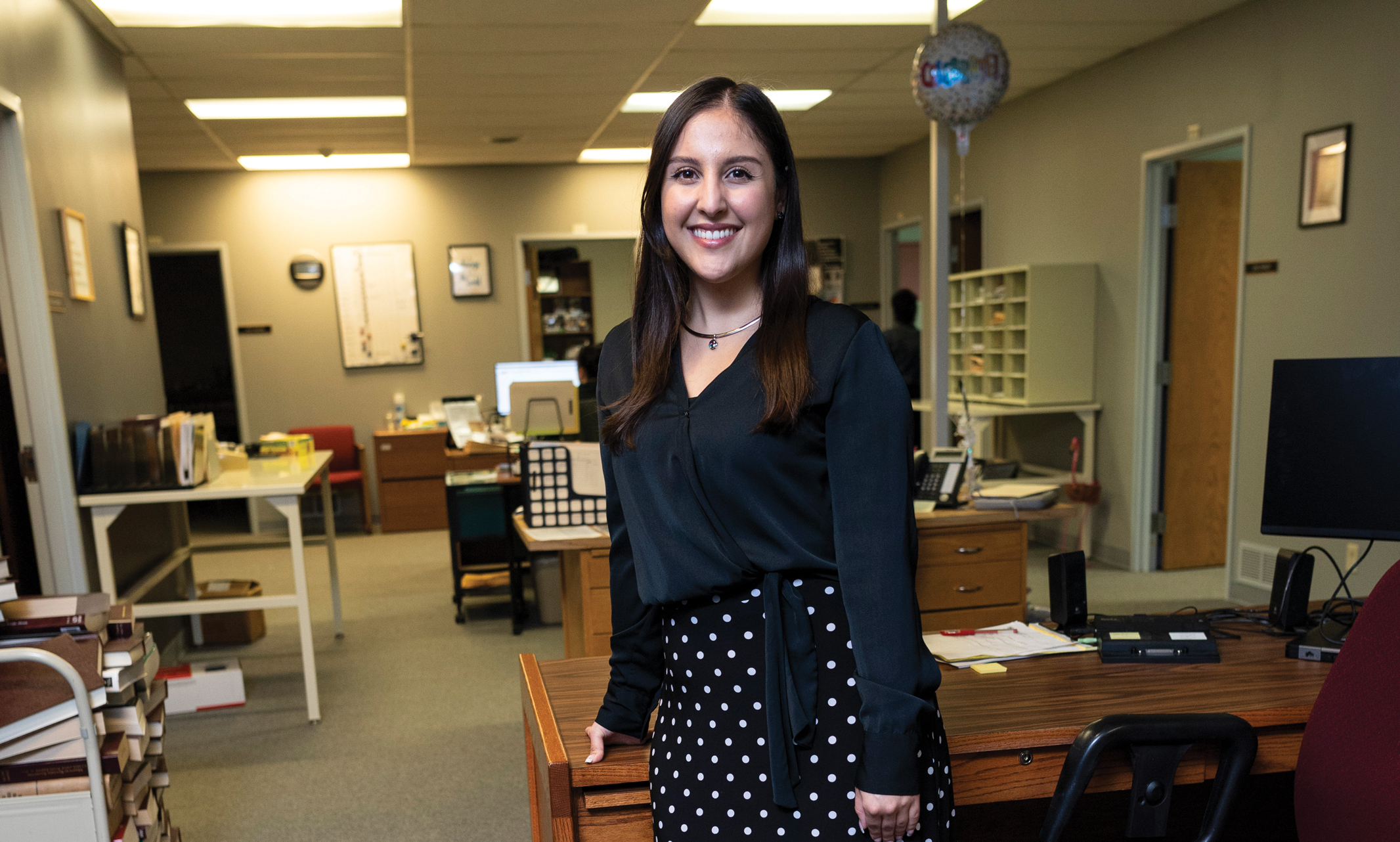
Recent Law graduates navigate the bar exam and first jobs — all during a global pandemic
The transition from law student to practicing attorney can be challenging. Add in the COVID-19 pandemic, quarantining and working and learning from home, and the transition becomes even more complex.
We spoke to three recent School of Law alumni about their transition from being a student, studying for and taking the bar exam and entering practice — all during a global pandemic.
Why did you become an attorney and what are your career goals?
Yasmin Herdoiza (J.D. ’21): I originally wanted to go into psychology or counseling. While working on my degree, I worked at a nonprofit where I did some in-home care for children with intellectual and physical disabilities. This experience showed me what it was like for disabled children living in poverty, and it sparked something in me to learn how to help them. I did some research on family law and talked to my father, who is an attorney, about guardian at litem work. He was super happy when I told him about my plans to go to law school, but there was no pressure to attend. I want to be a judge one day, because that is the way to make fundamental changes.
John Pipes (J.D. ’20): Before law school, I worked a couple of blue-collar jobs. I hadn’t found a career that suited me yet, but knew I wanted a job with a bigger purpose. I became a lawyer to help provide low-income Kansas Citians dignity in the legal process. Heartland Center for Jobs and Freedom is a great fit for the work I envisioned myself doing. I would like to stay here at Heartland and help build a movement alongside low-wage workers that uplifts them and improves their living and working conditions. My next career goal is to see Heartland Center and the Missouri Workers’ Center succeed in our campaign for Kansas City to pass a law that provides all tenants facing eviction an attorney to advocate for them. We know that universal representation is a game changer for tenants and all low-wage workers.
Claire Wyatt (J.D. ’21): I loved arguing and advocating from childhood onwards. My first love was film, but I quickly got burned out in the marketing and commercial world. I decided I wanted a career that gave me more purpose and the ability to serve others. I enjoy being in a courtroom. My passion is animal law. It’s a very small field with very few jobs. Animal law would be the dream. I also interned with Jackson County Prosecutors Office, which was great experience.
Herdoiza says she learned a great deal during her internship at the Missouri State Attorney’s Office, which allowed her to argue in court before she even graduated from law school.
What were your strategies for studying for the bar exam?
YH: Exercise kept me motivated. I went on a lot of walks. I got a Fitbit and logged hundreds of steps each time. I also had a rotation of flashcards and took them on my walks. My boyfriend walked with me and he would read the cards to me.
JP: I gained a lot of good skills studying for the bar. Due to the pandemic, I was home a lot and had time to study. I treated law school as a job and had a schedule each day. The closer I got to the exam, I added more and more work to my days. Normally, I would have studied at the library, but I had to study at home. That was the most difficult. But I learned to make it work, and now I’m more equipped to work from home.
CW: I spent several days compiling requested documentation about my ADD diagnosis and previous accommodations. I then had to appeal my denial of accommodations when the board denied my request. Eventually, they reversed the decision and granted me partial accommodations. I felt really proud of myself for advocating for myself using the sharp skills that UMKC Law taught me.
Preparing for the bar, there were many days I was not able to complete all the tasks that my bar prep program had assigned me, but I persevered. I am very grateful that it ended up being more than sufficient to pass the bar.
John Pipes (J.D. ’20) is an eviction defense attorney for the Heartland Center for Jobs and Freedom.
Where do you work now and what do you like about being an attorney?
YH: I work at the Missouri State Attorney’s Office. The experiences I got from my internship helped a lot. I have been doing discovery and working on low-level felonies. The pressure is high. When my clients are in custody, I worry about them.
I love being a public defender. I believe in the rehabilitative framework. Incarceration doesn’t prevent crime and affects more than just the accused. Many people can’t afford bond and that affects their families, jobs and housing. Sometimes people need to be provided a chance to succeed, even after they’ve previously failed. We must believe and support others.
JP: I graduated in May 2020, early in the pandemic. I went to work for a personal injury attorney for a few months, then decided to transition away from that work and applied for a Truman Fellowship. After three months as a Truman Fellow, I moved to the Heartland Center for Jobs and Freedom, where I took a long-term position doing similar tenant defense work. I work with low-wage workers who have found themselves defendants in eviction lawsuits and provide free legal representation and advice to those tenants.
While a Truman Fellow and now at Heartland Center, I enjoy providing great legal representation to individuals who so rarely have the money to hire a lawyer themselves. We at Heartland Center know how important it is for tenants to be represented by a lawyer. Without a lawyer, tenants lose their case 90% of the time since landlords are almost always represented by legal counsel. When tenants do have a lawyer advocating for them, the results are flipped, and an eviction is prevented in 99% of the cases. I enjoy helping to keep people housed in the long and short term.
CW: I am a Truman Fellow working with the UMKC Tenant Representative initiative. My daily job consists of performing client intakes, exchanging forms with the client, communicating with opposing counsel or pro se landlords (those who do not have legal counsel), reading leases and ledgers, drafting settlement agreements, updating clients on their case status and trying to help clients with related housing matters as best I am able. We have several evictions dockets each week in the Truman Fellowship, so court appearances are a big part of the job.
I love the work I’m doing. I love thinking critically and crafting arguments, and I love advocating for and helping people. I love solving problems, and I feel really fortunate that I’m in a position to help others solve theirs. Learning the law and finding a potential place for myself inside the institution of law has been one of the most empowering and transformative experiences in my life.
Claire Wyatt (J.D. ’21) is a current Truman Fellow working with the UMKC Tenant Representative Initiative. Wyatt says advocating for and helping people has been one of the best parts of being a new attorney.
Tell us about your transition from student to professional.
YH: Through my internship, I argued in court before I graduated, which was helpful. When my internship pivoted from in-person to virtual, the change was very difficult. I had to do things on my own. The most challenging part of transitioning from student to professional was the responsibility. My co-workers are helpful, but it is my name, my bar license and no one else’s. No one is responsible for me, but me.
JP: The Truman Fellowship really helped me with the transition and to hone my skills. I made appearances in front of judges, handled my own caseload, and pursued the best way to keep evictions off a person’s record. It was a real honor to be awarded a fellowship. The people I worked with were passionate, and I enjoyed having a transition period. I dipped my toes into the landlord-tenant space, which I now am involved with at Heartland. Since my fellowship, I have found a wonderful group of colleagues at Heartland Center who are enthusiastic about our work and treat one another with respect. For that I am grateful.
CW: The transition between student and professional was slower and more painstaking than I expected. The last nine months felt like nine years. I went straight from school into intensive bar prep. Pandemic fatigue was very prevalent over the summer, but we all had to soldier on and prepare for the bar exam. It was very rigorous, but I had to remember why I was doing all this – because I want to help people. Getting internships during my time in law school helped to ease the transition between student and professional because I was confident I’d be well prepared by the time I was finally licensed to practice. I am also really grateful for the UMKC Truman Fellowship, which allowed me to work for UMKC’s Tenant Representative Initiative after I took the bar but before I received my bar results. There is a dire need for tenant assistance, and it’s great that UMKC was willing to jump in and offer help. It has helped out so many people in our community by allowing them to stay in their homes while the pandemic rages on.
What advice do you have for someone considering law school?
YH: There is a steep learning curve. You’ll be drinking from a fire hydrant, but it’s fun. There’s nothing better than a client telling you, ‘thank you.’ It’s a really good feeling.
CW: I would encourage future law students to accept that in learning this new, vast discipline, they might at times feel stupid or incapable; they might fall short of their aspirations. I would encourage them to accept this fear instead of fighting it: join the mock trial team even if they’re afraid of how many hours it will add to their schedule, participate in student organizations as members or allies, and speak their truth when they’re afraid of how it will be received by their classmates. I would also tell new law students that their interests may change as they learn more about different areas of law and to be open to new opportunities and horizons as they appear.
Pipes says his Truman Fellowship from the School of Law helped him to hone his skills as a new attorney.
Dec 21, 2021
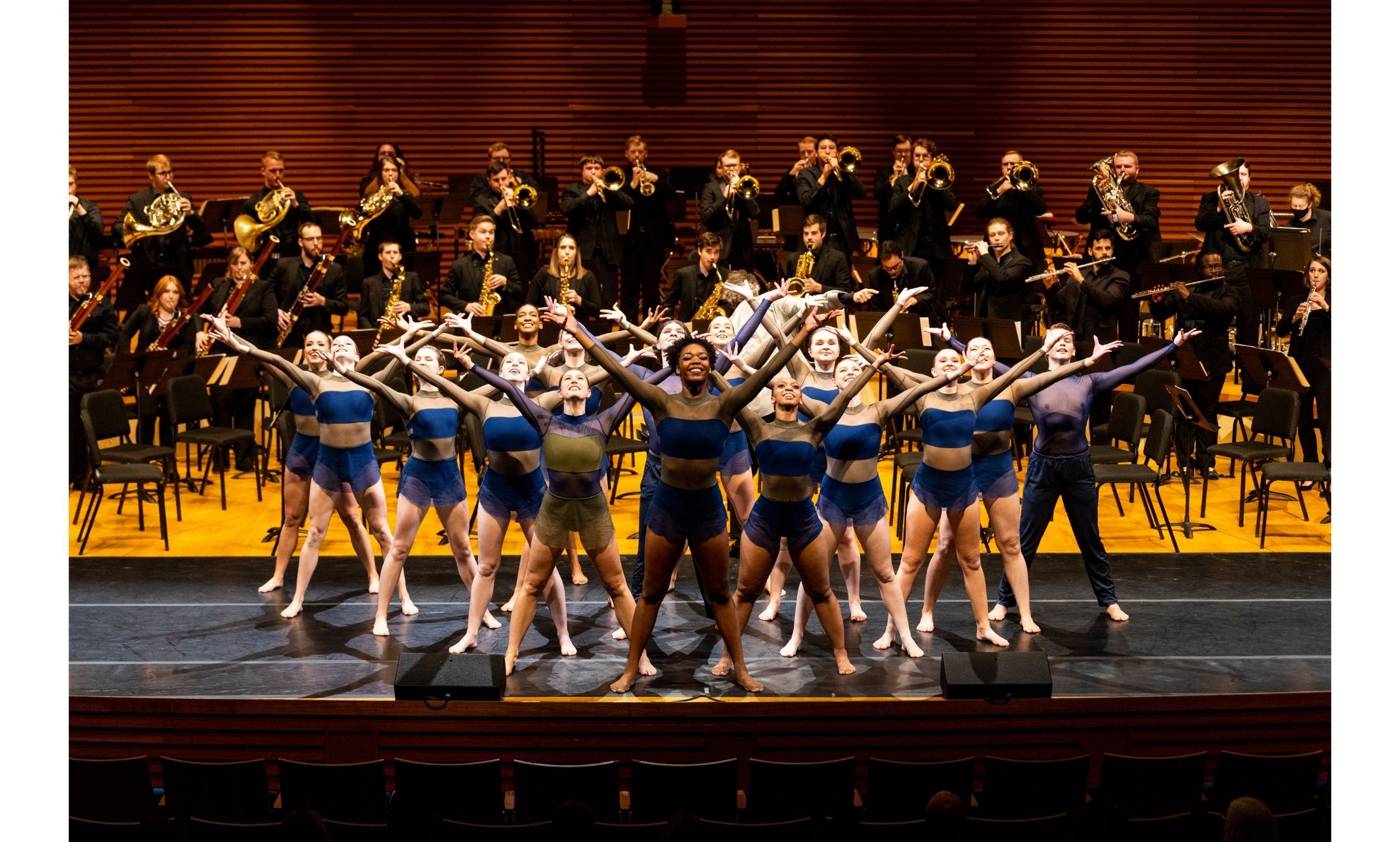
High flying dancers and vibrant musicians and actors took center stage at the 25th annual Crescendo Benefit Gala.
A group of talented student performers from the UMKC Conservatory left their hearts on stage at the Kauffman Performing Arts Center during a one-hour performance in celebration of the 25th anniversary of Crescendo.
UMKC and a host of community members, friends and alumni joined together to commemorate the 25th Anniversary of the Friends of the Conservatory's Crescendo Benefit Gala. Crescendo 2021 featured artistic performances led by the talented students and internationally acclaimed faculty of the UMKC Conservatory. From music to dance to theatre, the ensemble flowed together in uninterrupted succession throughout different locations around the concert hall creating a beautiful and visually stimulating atmosphere.
It was the Conservatory’s first in-person gala in two years, due to COVID.
“What we are celebrating, more than anything else, is commitment. The commitment to persevere through the time of dark theatres and empty seats,” said Mauli Agrawal, chancellor. “We arrived at this moment because of the commitment of the performers who continued to study and practice, the instructors who continued to teach and inspire, the donors who kept the faith that their ongoing generosity would pay off when the lights came up again.”
Held at the stunning Kauffman Center for the Performing Arts, one of the premier art venues in Kansas City, the one-hour performance followed a dinner and cocktail hour.
The event raised more than $815,000 to support student scholarships, which are essential to the Conservatory’s success and a critical part of recruiting and retaining top talent. Thanks to the generosity of donors who chose to add a “silver lining” and increase their sponsorship donation by 25 percent in recognition of the gala’s 25th year anniversary, a special Crescendo Silver Anniversary Scholarship endowment was established to assist performing arts students with the cost of tuition while studying at the UMKC Conservatory.
The UMKC Conservatory is home to the university’s Music, Dance and Theatre programs and has been recognized for its artistic excellence and innovation for more than 115 years.
Learn More About UMKC Conservatory
Dec 21, 2021
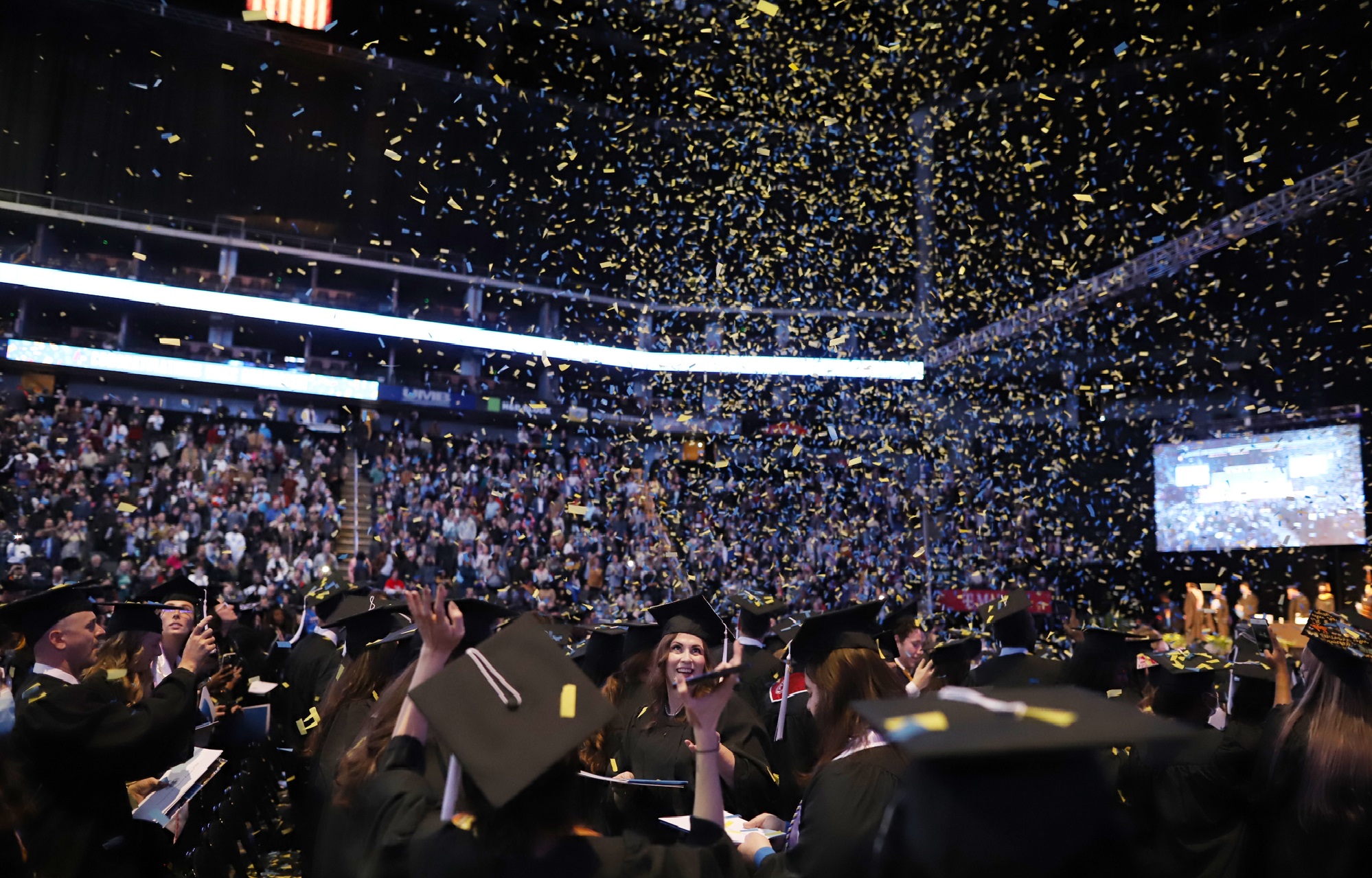
New Roo alumni celebrate graduation in the heart of Kansas City
The University of Missouri-Kansas City celebrated its graduates in a new downtown location fitting of Kansas City’s university.
UMKC Provost Jennifer Lundgren acted as grand marshal of the winter commencement ceremony at T-Mobile Center.
“We are delighted to be here today at the beautiful T-Mobile Center to continue our new tradition of celebrating our graduates at iconic Kansas City locations,” Lundgren said, referring to ceremonies last spring which were held at Kauffman Stadium.
Chancellor Mauli C. Agrawal congratulated the graduates and recognized their accomplishments.
“Earning a university degree is a significant accomplishment even under the best circumstances,” he said. “The class of 2021 has done so while overcoming a lifetime of challenges, starting with the great recession that arose when most of you were children, and continuing through to the ongoing global pandemic.”
Agrawal recognized the graduates’ resilience, perseverance and grit in the face of these challenges.
“That is something that you can carry proudly with you for the rest of your lives. Let it be a source of strength for you to draw on when you face the challenges yet to come.”
Olympic silver medalist and UMKC alumna Courtney Frerichs (B.A. ’15) congratulated the more than 1,000 new UMKC graduates. Frerichs rewrote the Roo record books in track and field and became a world-class competitor and Olympian in the steeplechase event, winning the silver medal in 3000 meter steeplechase at the 2020 Olympic games in Tokyo. She is the first American woman to break the nine-minute barrier for the event.
In preparation for her commencement address, Frerichs mined her recent Olympic experiences.
"Graduation is in many ways like a starting line, and I'm making a living knowing all about starting lines."
She said learning how to pivot and adjust her expectations has been an important part of her success, especially leading up to her silver medal race. The pandemic postponed her participation in the 2020 games and her dreams felt like they were being put on hold. But she found value in having one more year to train and prepare for the Olympics in 2021. She pulled her silver medal from around her neck to show the crowd.
"It paid off," she said to the cheering crowd.
Following Frerichs’s address and the recognition of individual graduates the class enjoyed taking part in the tradition of moving the tassels from the right of their caps to the left to symbolize the individual's movement from candidate to graduate. During the ceremony Chancellor Agrawal also recognized the supportive role family and friends have played in the lives of the graduates.
“Our part was easy. We provided them the knowledge and helped them to hone the skills they need to go to work and change the world for the better. You made them the outstanding people they are today.”
He noted that the graduates’ years at UMKC resemble the opening chapter in a good book.
“You just know there are a lot of great chapters to follow.”
At the conclusion of the program blue and gold confetti fell from the ceiling showering graduates seated in rows on the floor of the arena. An indoor pyrotechnics display launched near the stage as the crowd erupted in applause for this grand send-off for our 2021 Roo grads.
Dec 20, 2021
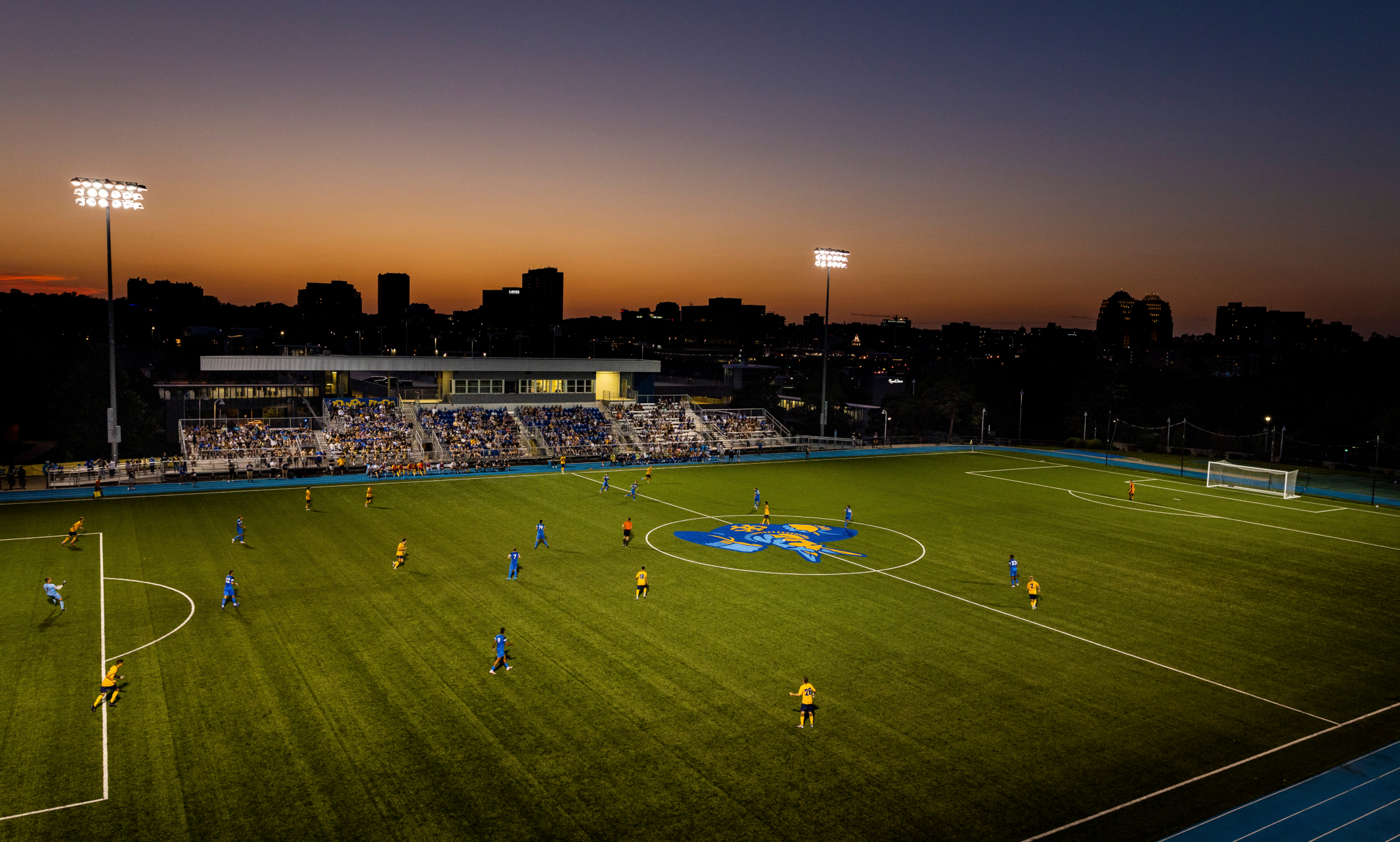
Moments we'll remember from this last year
From wrapping up the online spring semester with Commencement at The K to much-anticipated return to campus in the fall, 2021 has definitely been a year to remember.
Each year our campus photographers select some of their favorite images to share with us. Here are some of their favorites that highlight key moments this year.
Some of our favorite images are portraits we get to take of students, here is one of former Student Government Association President Brandon Henderson, who shared the importance of self-care.
Mascot bonding time: KC had a blast with Sluggerrr doing a photo shoot for our countdown to Commencement at The K this past May.
Two days of multiple ceremonies, some with rain, didn't dampen these smiles. Grads were pumped to have in-person Commencement at The K.
Incoming freshmen swung by campus on Commitment Day this spring to take some photos.
Students were excited for the dedication of our new Roo statue, designed by Kansas City artist Tom Corbin.
We love creating promo images of our student-athletes. Go Roos!
We got some great images from the Mental Health Mile color walk that Roos for Mental Health hosted on campus.
This year our Conservatory students returned to Kauffman Center for the Performing Arts for their annual Crescendo gala performance.
Not only has UMKC provided vaccine clinics for our employees and students, but many of our Roos have served in various roles in the vaccination rollout to our larger community across the city, state and region.
Dec 16, 2021
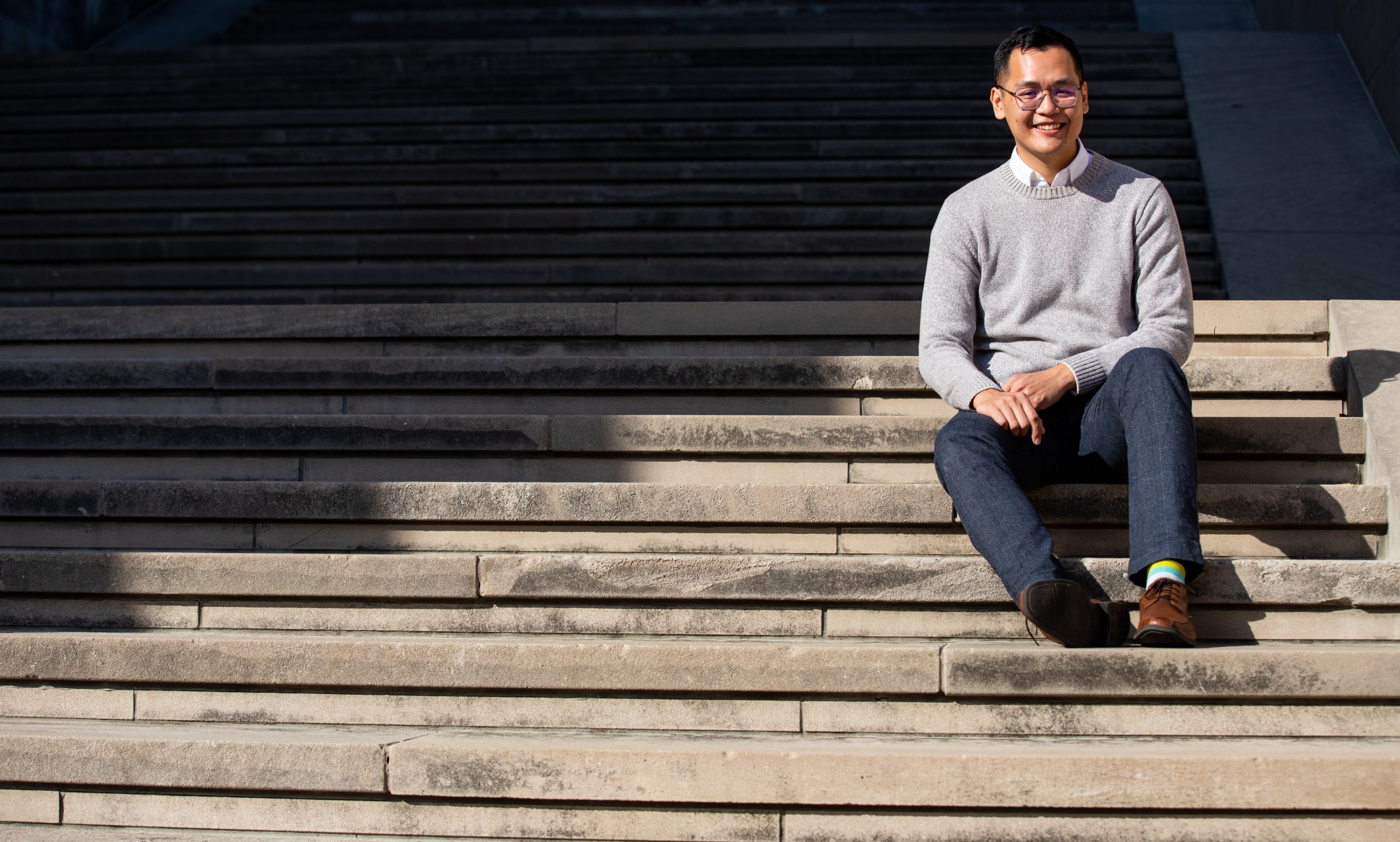
ICU healthcare provider offered comfort in a time of crisis
Roos don’t just dream, they do. Our students turn ideas into action every day. Get to know our people and you’ll know what UMKC is all about.
Name: Kevin DuAnticipated graduation year: May 2023UMKC degree program: Master of Medical Science – Physician AssistantHometown: Kansas City, MO
When Kevin Du, MMS, ’23, lost his father to an acute myocardial infarction three years ago, he was numb, but he remembers that a care provider in the ICU stopped to comfort him.
“I remember how kind she was and how heard I felt,” he says. “Looking back on that is what initiated my interest in the physician assistant profession, and I know that I want to be that type of provider in my career.”
Du is currently enrolled in the physician assistant program at the UMKC School of Medicine. He says the pace of the program can be a challenge, but he loves the small class sizes and the support he receives from the staff members.
“Also, we are a smaller cohort, so we receive more personalized attention from our amazing, supportive faculty when we need it.”
“UMKC is culturally diverse and encourages students to be understanding of others’ backgrounds. I admire the commitment to the community.”
Du is a first generation college student. His parents immigrated to the United States following the Vietnam War and settled in Kansas City. While his parents’ goals for him were more focused on having a happy life than the pursuit of an advance degree, Du would like his achievements to inspire future generations in his family and make his mother proud.
“I want to pay my mom back for all the sacrifices she made for me and validate my parents’ choice to immigrate here,” he says.
Du believes his confidence has allowed him to learn new things and expand his opportunities.
"We are a smaller cohort, so we can receive more personalized attention from our amazing, supportive faculty when we need it.”
“I will always be the first one to volunteer or answer a question,” Du says. “Whether I answer correctly or perform well does not matter to me. I take all my successes and failures in stride and just treat everything as a learning experience. After every experience I ask, ‘How did I do that, and can I do it better?’ This has given me a positive outlook on life and more perspective on how I can improve on myself.”
Du is the president of the UMKC Physician Assistant Student Association and appreciates the inclusivity of the UMKC environment.
“UMKC is culturally diverse and encourages students to be understanding of others’ backgrounds. I admire the commitment to the community.”
Dec 16, 2021
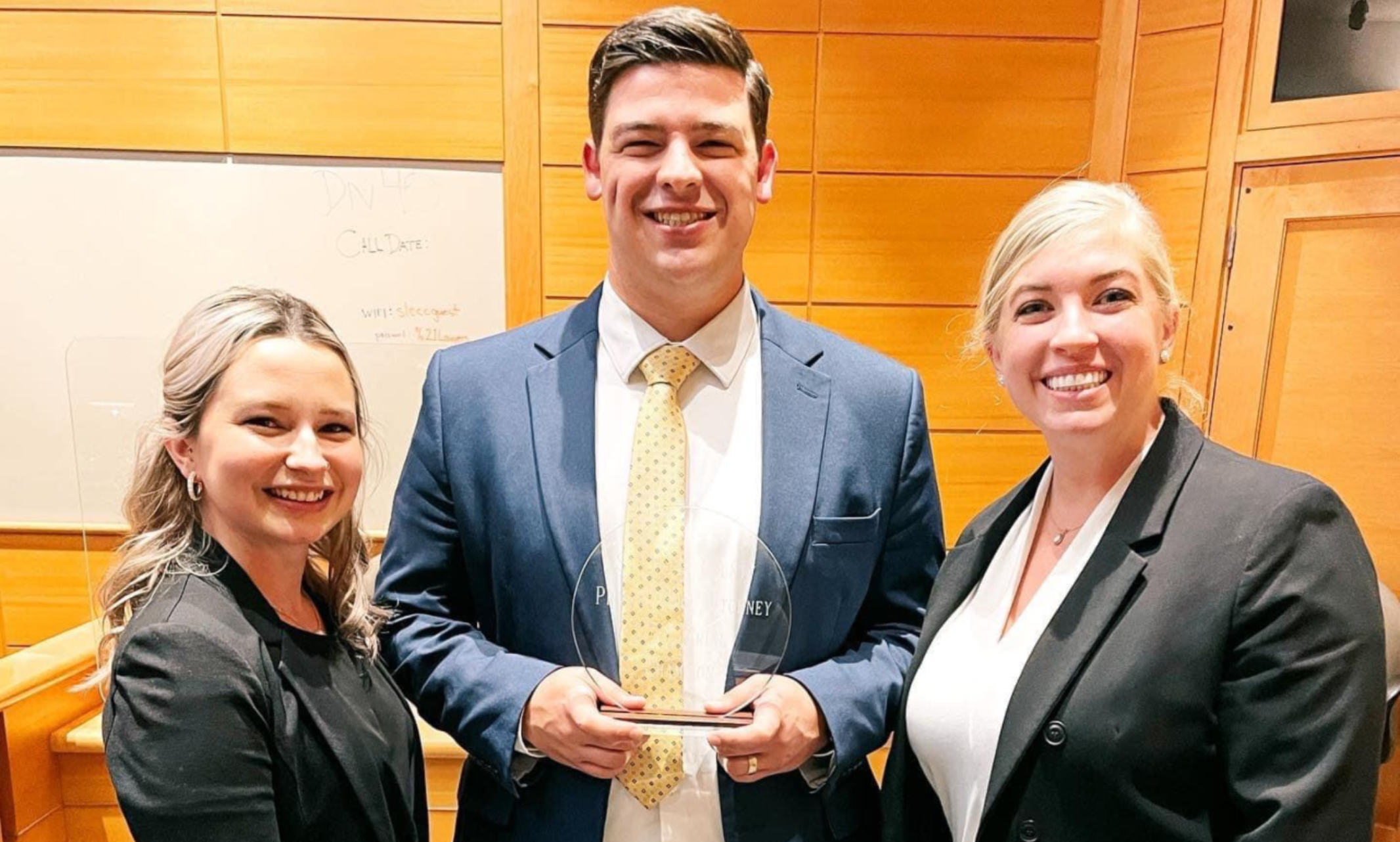
The team beat out several other Missouri law schools
A University of Missouri-Kansas City School of Law mock trial team took home top prize at the 2021 Missouri Prosecutor's Cup Mock Trial Competition.
The Prosecutors Cup is a mock trial competition among Missouri's top law schools. UMKC students studying for careers in the legal profession used trial advocacy skills to try cases against each other. This year's winning team included Trey Allison (3L), Alissa Beirmaier (3L) and Margaret Stansell (3L), coached by law professor Michaelle Tobin.
"My first reaction when I found out we had won was absolute joy. I was so excited to compete and so proud of my team. We put in a lot of hard work and late nights to prepare for this and I was so happy that work paid off and we were able to come home with a win," Stansell said.
The competition, held in St. Louis in late November, featured mock trial teams from across the state of Missouri, including teams from Washington University in St. Louis and the University of Missouri-Columbia.
After winning the competition the championship team had the opportunity to have an exhibition round with practicing attorneys as opposing counsel.
Scott Rosenblum, of Rosenblum Schwartz & Fry, Travis Noble, of Travis Noble P.C., and several other high profile St. Louis attorneys acted as defense counsel. The U.S. Attorney for the Eastern District of Missouri, Sayler Fleming, played the defendant and the Honorable George Draper of the Missouri Supreme Court was the judge.
UMKC sent two teams to the competition, the winning team, and another team that finished undefeated but came up just six points shy of advancing to the final round. The undefeated team was comprised of Casey Campbell (3L), Lauren Gregory (3L) and Eric Honea (3L).
"This win is so important to me as a 3L because it reflects all the skills I've learned, nurtured and crafted over the years in undergrad mock trial and on the law school team," Stansell said. "It always feels good to win but this was so special because we're about to graduate and really only have a few chances left to compete and bring these accolades to our school."
Dec 16, 2021
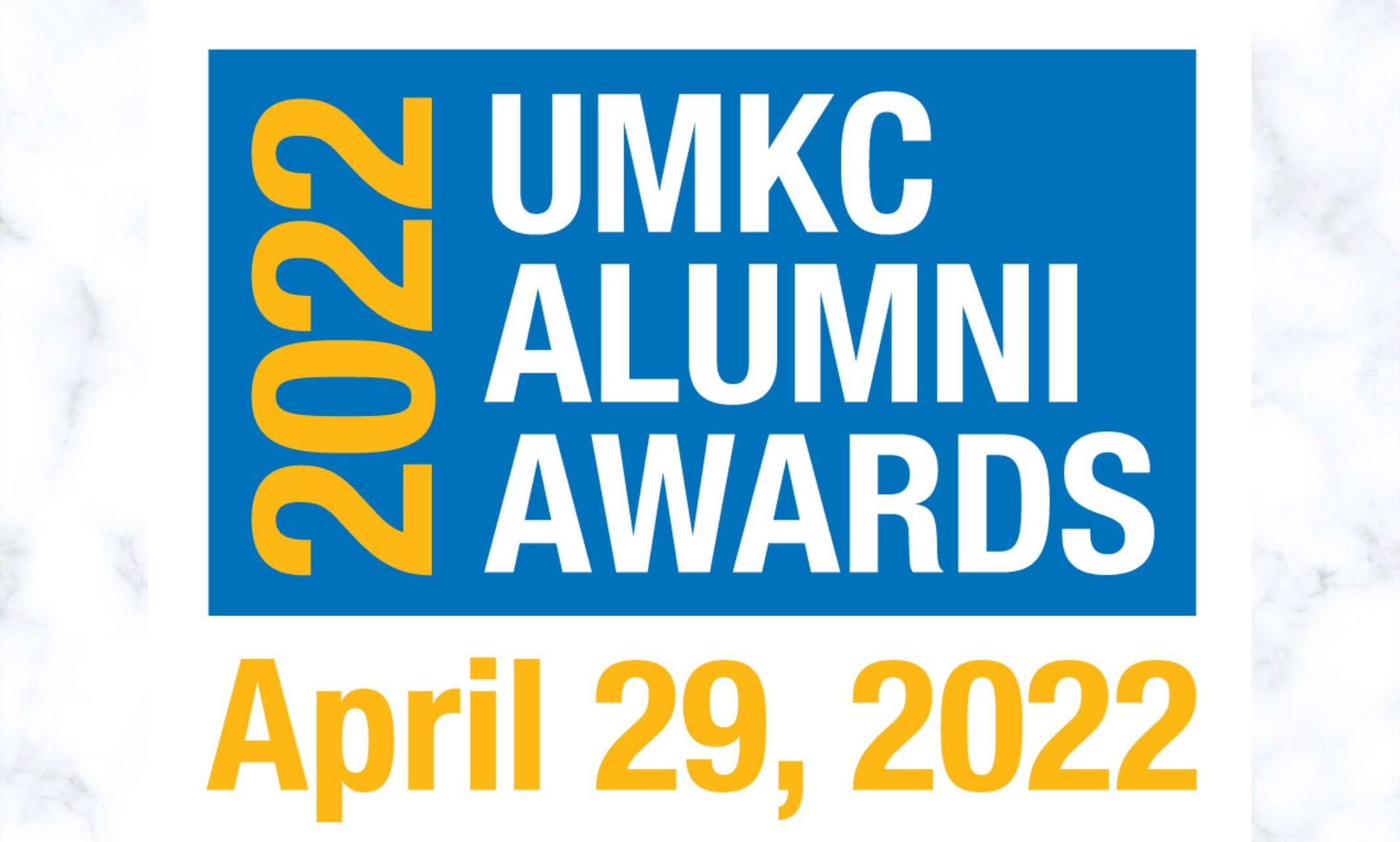
Sixteen alumni and one family will be honored on April 29
The University of Missouri-Kansas City Class of 2022 Alumni Achievement Award recipients include the founder of a veterans housing program, a judge, national CEO and a legacy family whose education and contributions to UMKC have spanned generations.
Join us in honoring the Class of 2022 awardees in an in-person celebration at 6 p.m. April 29, at the James C. Olson Performing Arts Center. Visit UMKC's Alumni Association website to learn more about this year's honorees and the event. If you are unable to attend the event but would like to donate to student scholarships, contributions can be made online.
The Alumni Awards ceremony is one of the university’s largest events to support student scholarships. In the last decade, the Alumni Awards event has garnered more than $1 million in scholarships and immediate aid for UMKC students.
Co-chairs for the 2022 event are Dr. Joseph P. Spalitto (B.S. ’68, D.D.S. ’72) and Debbie Thompson (B.S.D.H. ’81)
University-Wide Alumni Awardees
Alumnus of the Year: Bryan Meyer (B.A. ’11, M.P.A. ’15, J.D. ‘15)
Bryan served in the Marine Corps for five years before coming to UMKC. After his Marine service, he earned three degrees from UMKC: Bachelor’s (2011), JD and MPA (2015). Following graduation in 2015, he then turned his attention to helping fellow veterans by helping to establish the Veterans Community Project (VCP) in Kansas City. He now serves as the CEO of VCP, which is an innovative non-profit that provides housing for homeless veterans in a tiny home village. The village setting provides a sanctuary and emotional space needed for veterans to live and collaborate with those from similar backgrounds and shared experiences. A variety of services are offered to VCP residents, including a Veteran Support Services unit that works to address the underlying causes of homelessness. VCP also provides case managers who work with veterans to achieve incremental, lasting results in the areas of health and wellness, education, employment, financial literacy and the development of a personal support network. Bryan is driven by service and is passionate about building an organization that serves veterans.
Spotlight Award: Riddhiman Das (B.S. ’12, M.S. ‘19)
Das graduated from UMKC with a bachelor’s degree in computer science in 2012 and earned his master’s degree in computer science in 2019. While in school he was a part of the Henry W. Bloch School of Management Entrepreneurship Scholars program, which allows students to develop a business idea alongside a peer group while working with mentors who are accomplished local entrepreneurs.
In the fall of 2019, Das launched a company called TripleBlind, where he currently serves as CEO & Co-Founder. TripleBlind offers data privacy as a service to companies, allowing them to safely provide and consume sensitive data and algorithms in an encrypted space, without compromising privacy or security. Das has spent most of his career in leadership and has held various technical roles in software and product development, academia and consulting across a variety of industries. He is a recipient of the 2013 White House Champion of Change award presented by President Barack Obama. Das was named the 2013 Technologist of the Year by Silicon Prairie News and was featured in Ingram’s Kansas City Business Magazine in 2014.
The Bill French Alumni Service Award: Ann Mesle (J.D. ‘72)
In the midst of building a successful law career, Judge Ann Mesle has dedicated a significant amount of time and service to her alma matter, UMKC. She has served on several boards including the UMKC Law Foundation (President), UMKC Trustees, Martha Starr Education Fund (Co-Chair) and the Board of Diastole-Hospital Hill (Chair). She has received the UMKC Law Foundation’s Lifetime Achievement Award, its Alumni Achievement Award and its Best Friend Award.
Judge Mesle’s leadership has been demonstrated on various UMKC boards and committees including the Capital Campaign and Stewardship and Events (Chair), UMKC Trustees Board and Executive Board, Athletic Foundation, UMKC Trustees Initiative-Law, Law Foundation Board, Law Foundation, and as a Law Foundation Emeritus Trustee. Additionally, she has served on the boards of innumerable civic organizations, including years of service to the Kansas City Bar.
Defying the Odds Award: Susan B. Wilson, Ph.D. (MBA ’05)
Susan B. Wilson, Ph.D. (MBA ’05) is a proud UMKC graduate whose professional accomplishments are a stellar reflection on the University. Susan attended the University of Pittsburgh and earned three degrees. She pushed past poverty, discouragement from professors, racism and discrimination to seek research opportunities and guidance needed to prepare her for the application process for the school’s graduate psychology program. Susan was accepted to the clinical psychology program and matriculated through the very rigorous program as a single parent of two children.
Susan went on to complete her Ph.D. and secured a post-doctoral fellowship at the Menninger Foundation in Topeka. She moved to Kansas City in 1989 and went on to have a multifaceted career in healthcare administration, education and broadcasting. She served as a treating clinician for the Kansas City Chiefs and the National Football League (NFL). In 2005 Susan received her MBA at UMKC and in 2008 became the associate dean for diversity and community partnership at the UMKC School of Medicine. She was named vice chancellor for diversity and inclusion in 2014. During her tenure, she implemented a comprehensive, campus-wide plan for diversity and inclusion, built diversity and inclusion training programs, launched the Faculty Diversity Dialogues program and campus Diversity Advocates programs for students and employees. She retired from her role in January 2021, but has continued working with the School of Dentistry in a diversity and inclusion role.
Legacy Award: North/Cheadle Family
The North/Cheadle family’s UMKC legacy dates back to the 1960’s. Don Cheadle Sr. (M.A. ’70) and his brother-in-law Basil North Jr. (B.A. ‘61, J.D. ‘71) were the first in their family to graduate from Kansas City’s university and laid the path for many generations that followed to become ‘Roos.
North’s daughters, Sheryl North (M.D. ’82) and Maria North Morgan (J.D. ’91) are both UMKC alumni. A host of other relatives have attended UMKC including: Glenn North, Jr. (M.F.A. ’20), Stasi Bobo–Ligon (B.B.A. ’88), Dione Cheadle (B.A. ’89), Myles Cheadle (attended) and Kellie North (attended).
Not only did members of this family graduate and/or attend UMKC, they selected different coursework, so this award represents excellence across several schools on campus. Many of these students have also succeeded in other interests such as art and music. The family is also very committed to public service, with many participating in numerous and impactful volunteer initiatives.
School Alumni Achievement Award Recipients
College of Arts and Sciences: Melissa Zarda (B.A. ’02, M.A. ‘07)
Owner, Pixel Lunch LLC
School of Biological and Chemical Sciences: Joseph Lambing (Ph.D. ‘90)
Senior Vice President, Bristol Myers Squibb, formerly MyoKardia (retired)
Henry W. Bloch School of Management: Mike Perry (B.B.A. ’89)
President & CEO, Hallmark Cards, Inc.
School of Computing and Engineering: Jungwoo Ryoo (B.S. ’96, M.S. ’98)
Professor, Information Sciences and Technology; director, Division of Business, Engineering, and Information Sciences and Technology (BEIST), the Pennsylvania State University-Altoona.
Conservatory: Dr. Xi Wang (M.M. ’03)
Associate Professor, Music Composition and Theory, Southern Methodist University
School of Dentistry: Brenda Bohaty (Ph.D. ’09)
Nelson Professor and Chair, Department of Pediatric Dentistry, University of Missouri-Kansas City School of Dentistry
School of Dentistry – Dental Hygiene: Jo Ann Weatherwax (B.S.D.H. ’06, M.S. ’12)
Founder/director, Volusia County Health Department Dental Program (retired)
School of Education: Lucero Garibay (M.A. ‘16)
Floor Supervisor and Psychotherapist, Pilsen Wellness Center
School of Law: J. Kent Emison (J.D. ’81)
Partner, Langdon & Emison LLC
School of Medicine: Lucky Atul Chopra (B.A. ’91, M.D. ’92)
CEO, Advanced Diagnostics Healthcare
School of Nursing and Health Studies: Leslie Luke (M.S.N. ’00)
Family Nurse Practitioner/Owner, The Care Clinic
School of Pharmacy: Janelle Sabo (Pharm.D. ’00)
Vice President of Clinical Capabilities, Eli Lilly and Company
Dec 15, 2021
AccessLex proves to be a valuable resource for UMKC law students
A nationwide program is helping UMKC students take charge of their finances and mitigate the cost of law school.
The AccessLex Institute is a non-profit dedicated to improving access to law school. It offers a program called MAX by AccessLex at 174 law schools across the country, which provides quick, easy-to-understand personal finance lessons for students, including how to pay for law school, retirement and investing. Recently the UMKC School of Law was named among the top 10 schools in the country for personal finance course completion on MAX by AccessLex.
Dean Barbara Glesner Fines said that the high participation for UMKC students did not come by accident. The law school integrated the financial literacy program and frequently promotes its use by hosting presentations, sending monthly reminders and providing access to AccessLex counselors. “What makes us stand out is that we uniquely take advantage of opportunities and that’s why our students do so well in the MAX program,” said Glesner Fines.Being a law student is inherently stressful, but Glesner Fines said when students are financially strapped on top of stressing over rigorous coursework, it is apparent. “I see it so powerfully when a student doesn’t have to worry about financing their legal education or retaining huge student loans, it affects the classes they choose, the internship they take, the ability to do pro bono work and volunteer, the ability to be in competitions, be on the trial team or client counseling team. And it affects their career choices for the rest of their life.”While many of UMKC’s law students go on to pursue lucrative careers in the private sector, Glesner Fines said a majority go to work in prosecutor and public defender offices.“These are such critical roles in our community in providing access to justice, but they do not pay as much as other legal employment opportunities. If a student graduates with excessive student loan debt, they may find these career choices are simply unmanageable for them,” she said. In addition to MAX programs, UMKC students have also benefited from other AccessLex benefits. In 2019, UMKC law student Kourtney Hodge was awarded a $40,000 scholarship from the non-profit. UMKC Law also received a $25,000 grant in 2020 to assist with emergency expenses during the COVID-19 pandemic. Those funds helped students purchase technology for remote classes, provided assistance to students whose employment was affected by the pandemic, provided child care and helped with paying for medical crises. “They’ve been very generous partners,” said Glesner Fines.
Dec 14, 2021
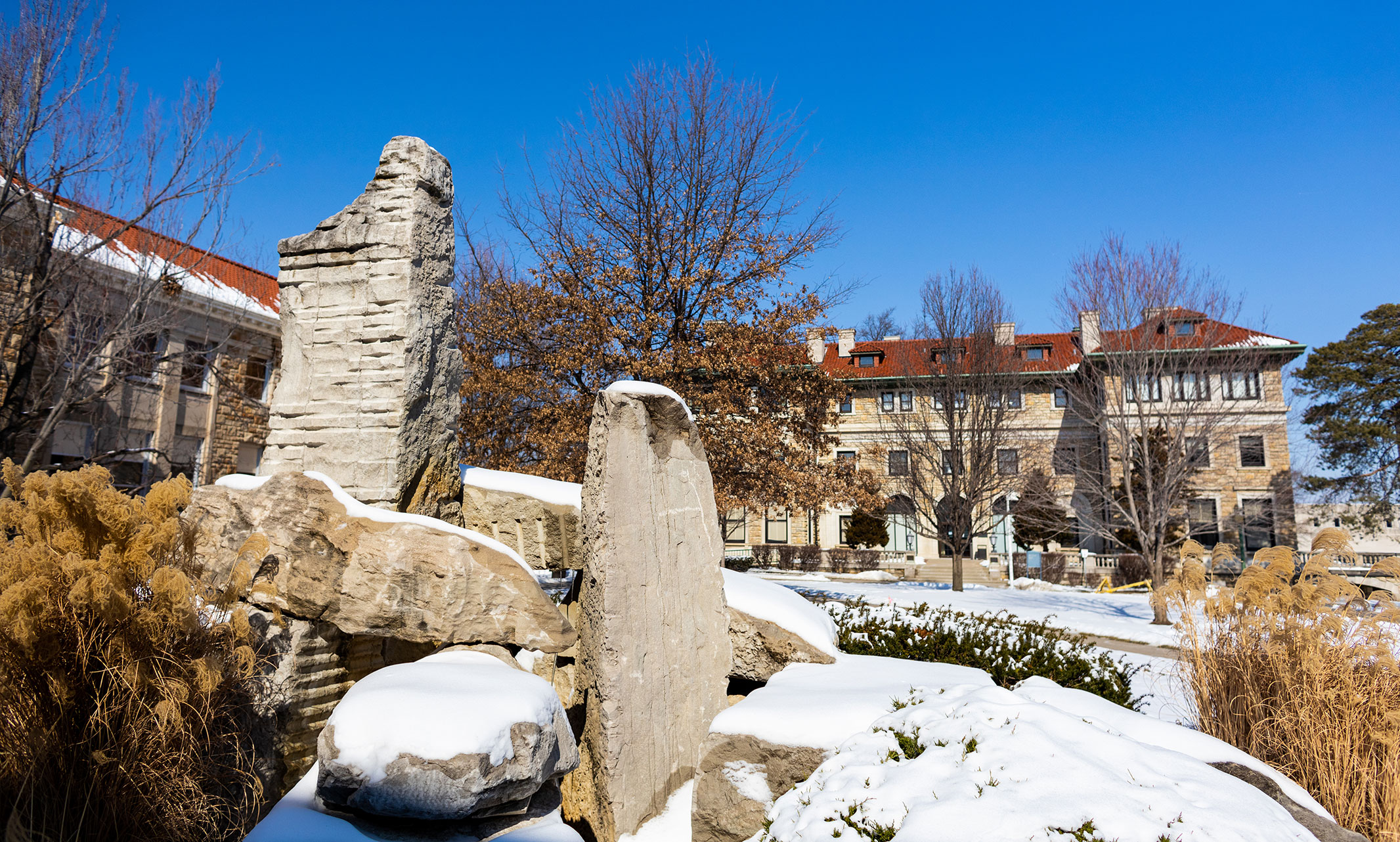
We asked the UMKC community to share their favorite winter-time activity
While we love this town in all seasons, Kansas City is particularly cool in the winter.
Not just in temperature, of course, but in how many exciting things there are to do. We asked our UMKC community on Instagram what their favorite thing to do is in Kansas City in the wintertime, and we’re sharing the best of them here for your own cold-weather enjoyment!
KC Rep’s A Christmas Carol
The Kansas City Repertory Theater and UMKC have a long history. Located on UMKC’s Volker campus the Rep is a popular place during the holiday season for it’s well known tradition of putting on A Christmas Carol, a musical version of the classic Charles Dickens tale. With stunning performance, sets and costumes, it is sure to wow and warm the heart of any Scrooge.
UMKC Basketball Games
When the weather outside is frightful, there’s nothing more delightful than catching a game at the Swinney Center, where our players are always heating up! You can catch men’s and women’s basketball games all season long. Don’t forget to check the athletics site for the latest info and to get your tickets!
Kansas City Zoo & Aquarium
One of Kansas City’s favorite outdoor attractions is not just for summertime! This is one of the best seasons to see the Kansas City Zoo & Aquarium. There’s an outdoor polar bear exhibit, and on Saturdays and Sundays, you can watch the Penguin March at 11 a.m. It’s one of the zoo’s most popular events.
Crown Center
This city district, just west of our Health Sciences campus, is the holiday headquarters of Kansas City. It’s home to the Mayor’s Christmas Tree, and the beloved Ice Terrace, the premiere spot for ice skating in town. Warm up inside with some holiday shopping, delicious food and festive special performances in their two theaters.
See the Lights
It can be a bit of a downer when the sun sets before 5 p.m. each night, but what better to lift low spirits than twinkling lights. There’s so many to see all through Kansas City. From public walkthrough displays, like Powell Gardens Festival of Lights, to drive-through spectacles like Winter Magic at Swope Park, there’s a glow out there for everyone. Short on cash? Drive by Ward Parkway or Candy Cane Lane, a neighborhood light spot that’s been a Kansas City area staple for more than fifty years. And speaking of lights…
The Plaza Lights
We’d be remiss not to mention the world-famous Country Club Plaza Lights, within walking distance of our Volker campus. Kansas City has kicked off the holiday season with a lighting ceremony here since the 1930’s. Grab a hot beverage and enjoy them while you frequent the many Plaza shops, or just take the most festive walk of the season.
Dec 14, 2021
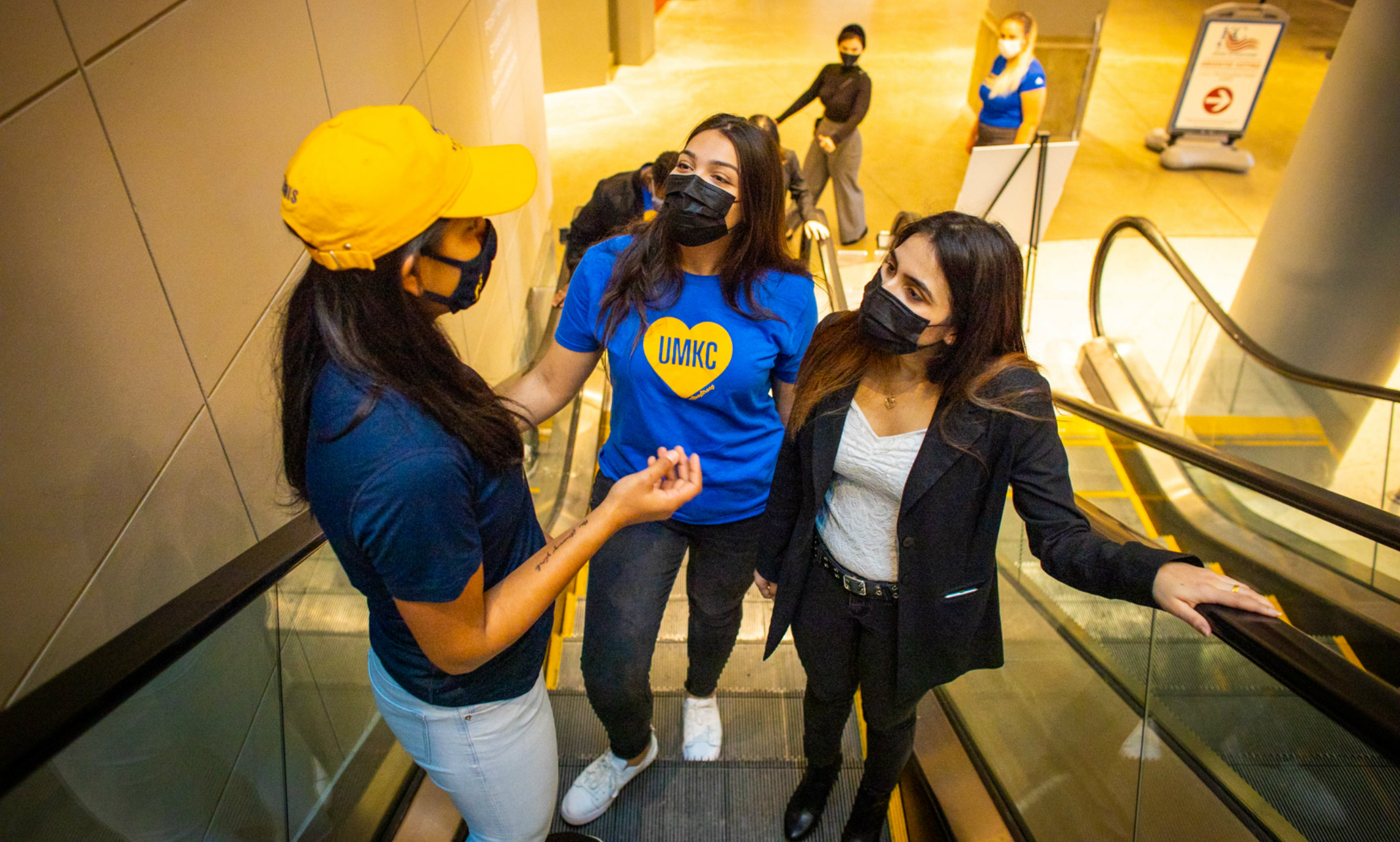
A year of investment, innovation and bold initiatives
The year 2021 will be remembered as the one in which UMKC created a sharply sloped upward spike in its growth graph, launching strong initiatives with impact that will be felt for years. The year saw the opening of a new high tech research center, the launch of the UMKC Forward reimagination initiative, the unveiling of a new outdoor artwork to serve as a campus rallying point, and much more.
Here are the university’s Top 10 stories of 2021.
UMKC Forward Will Invest More Than $50 Million to $60 Million for Excellence and Achievement
The University of Missouri-Kansas City rolled out its UMKC Forward plan, pledging to invest more than $50 million to $60 million over the next five years in five key investments. Chancellor Mauli Agrawal said the investments are designed to achieve growth and excellence for Kansas City’s university. In addition, the university will spend another $5 million to hire new faculty in key strategic areas over the next three years.
Introducing a Bold New Concept in Higher Education: Professional Career Escalators™
A centerpiece initiative of the UMKC Forward plan will create the university’s signature Professional Career Escalators™ program. This innovative student success initiative includes a unique system of personalized support and services to propel students from their academic studies to good-paying careers. University officials believe the combined features and goals of the program make it unlike anything being offered at any other college or university in the United States.
UMKC Welcomes Public to $32 Million High-Tech Research Center
The five-story, 57,800 square-foot Robert W. Plaster Free Enterprise and Research Center features 11 state-of-the-art research labs. It is the largest privately-funded capital project in UMKC history, with more than 25 donors.
Roo Sculpture by Artist Tom Corbin Settles Into New Home
UMKC students, faculty and staff welcomed the newest UMKC Roo to campus in the first public event since the beginning of the COVID-19 pandemic. Mahreen Ansari, UMKC Student Government Association president, introduced the Roo sculpture by artist Tom Corbin that stands proudly in the heart of campus on the University Walkway near the Miller Nichols Library and Learning Center.
Commencement at The K: Unique In Every Way
The university emerged from more than a year of pandemic isolation in spectacular fashion, as the community celebrated the degrees earned by more than 2,300 graduates in a historic two-day commencement celebration at Kauffman Stadium, home of the Kansas City Royals.
UMKC Awarded $5 Million to Fight COVID on the East Side
The Jackson County Legislature has appropriated about $5 million in CARES Act funding to a project led by UMKC to promote and deliver widespread COVID-19 vaccinations and other health services to neighborhoods on Kansas City’s east side, the city’s most socially vulnerable community.
UMKC to Serve as Backbone for $10M National STEM Education Initiative for Students with Disabilities
The university will serve as backbone for a $10 million research effort from the National Science Foundation, or NSF, to promote science, technology, engineering and mathematics, or STEM, education among students with disabilities. Auburn University will lead the five-year project while UMKC will "backbone," or guide vision and strategy, support aligned activities, establish shared measurement practices and support the implementation of research, according to the NSF.
African American Students Cite Chancellor for Leadership
The African American Student Union (TAASU) surprised Chancellor Mauli Agrawal in his office April 12 with the presentation of the Dr. Joseph Seabrooks Jr. Leadership Award. The award recognizes the service, leadership, professionalism and dedication of a faculty or staff member. TAASU members wanted to let the chancellor know how much they appreciated his leadership during the difficult social justice events of the past year.
$15.2M Renovation Underway at Bloch Heritage Hall
When completed, the renovation of Bloch Heritage Hall will be more than new carpet and reconfigured classrooms. It will be even more than eye-popping technology, although the reimagined facility that has anchored the Bloch School since its earliest days also will get that. The $15.2 million renovation, expected to welcome students by the Fall 2022 semester, is really about fulfilling its namesake’s unwavering vision of excellence for the school.
RoosDo: UMKC Launches New Campaign to Highlight Success Stories
The university launched a new branding and marketing campaign to demonstrate how UMKC people are powering our community by making discoveries, serving others and challenging the status quo.
Dec 13, 2021
Eight students honored for academic excellence, leadership and service
Eight graduating seniors who have excelled in both academic achievement and service were named as a Dean of Students Honor Recipients this fall. This program recognizes the exceptional students who maintain high scholastic performance while actively participating in University and community leadership and service activities outside of the classroom. Students were nominated by faculty and staff across campus for the honor.
The Division of Student Affairs hosts a breakfast for the recipients to celebrate this distinguished award with their family and nominators.
For many of the students, it is one of the last events that give them an opportunity to reflect upon their career at UMKC before they cross the stage at Commencement. Fellow awardee Morgan Kensinger had this to say about what her experience as a Roo has taught her.
"As a medical student at UMKC, I have seen how imperative and remarkable human connection can be. Holding the hand of a fearful patient. Sharing a laugh with a classmate after a stressful exam. Listening to stories from my mentors. Giving a helping hand to a member of our KC community. Connection defines us," she said. "And while we are all here to celebrate the service and honorable acts that we have completed over the past several years, I think we can all agree that it’s not the act itself that binds us, but the stories and moments shared. I have been so incredibly privileged to learn alongside amazing students and work with truly resilient patients. It is my sincerest hope that I take the lessons learned and appreciation for human connection forward with me in my career."
Congratulations to the Fall 2021 Honor Recipients!
· Nichole Alexander, College of Arts and Sciences, nominated by Lynne O’Dell
· Courtney Dorris, School of Medicine, nominated by Brent McCoy
· Anya Joyo, School of Medicine, nominated by Krisana West
· Morgan Kensinger, School of Medicine, nominated by Muhammad Shah Miran
· Micah McGlaughlin, School of Biological and Chemical Sciences, nominated by Katie Garey
· Victoria Pavlik, School of Nursing and Health Studies, nominated by Matthew Chrisman
· Matthew Robinson, College of Arts and Sciences, nominated by Mathew Forstater
· Krithika Selva Rajoo, College of Arts and Sciences, nominated by Crystal Doss
Dec 10, 2021
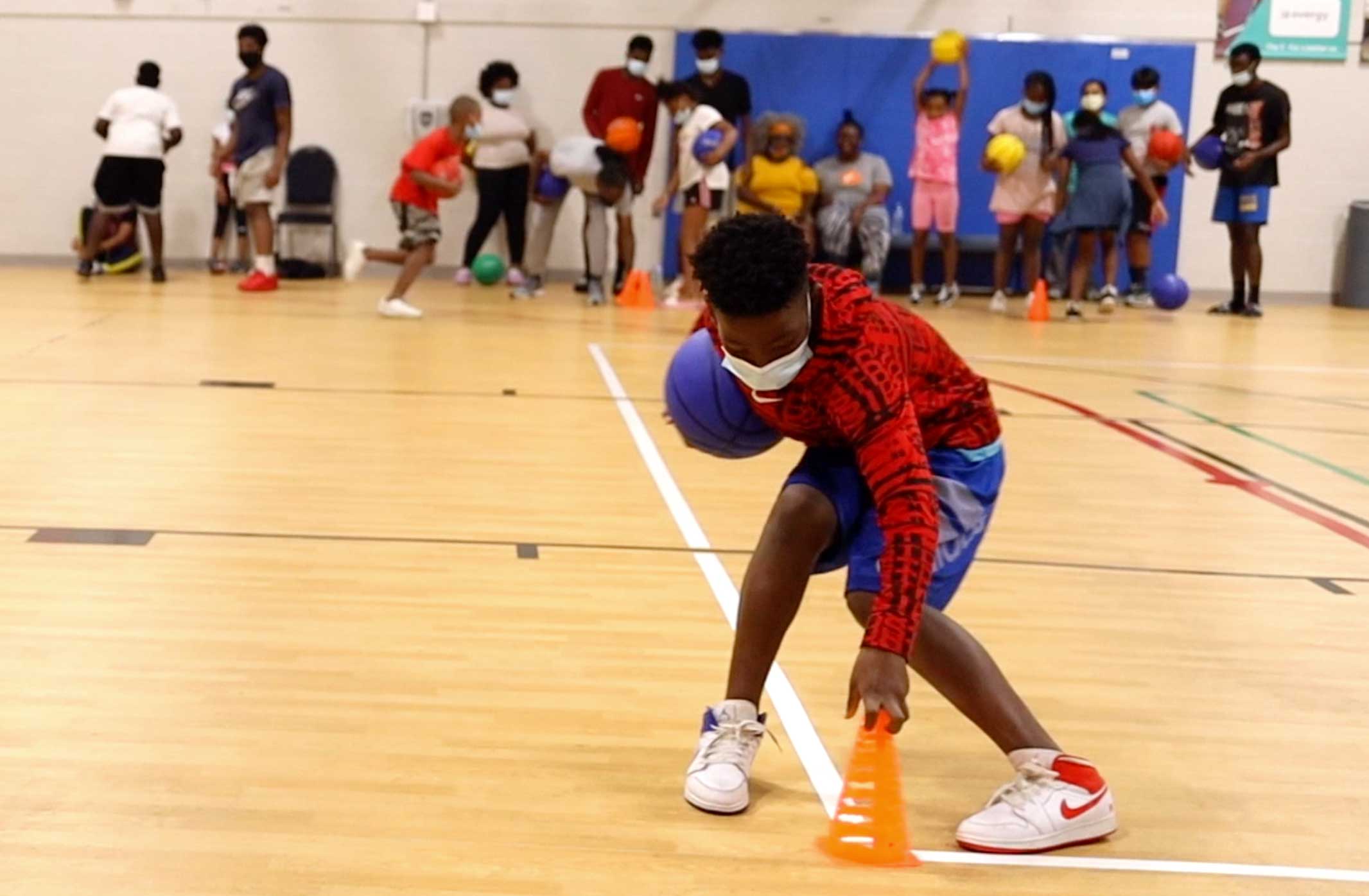
Advocating for physical education as public health policy
If parents notice a more active school day for their kids, they can thank two public health researchers at the UMKC School of Nursing and Health Studies. Joseph Lightner and Amanda Grimes authored recommended changes to physical education requirements nationally. The new guidelines recommend kids get at least 60 minutes of physical activity each school day.
“With these guidelines laid out and the evidence supporting them,” said Grimes, “we hope that someone working at the local level can use these to enact change in their community.”
According to Grimes, the guidelines have academic benefits as well. “Is physical activity of lesser value than academics?” said Grimes. “We just know that the research shows they are tightly correlated. Kids who are more physically active do better in school, behaviorally and academically.”
Lightner and Grimes work with the local program Move More, Get More, whose goal is to increase physical activity and nutrition among middle school students in Kansas City public schools. Part of the program tracks how active students are in their daily lives through pedometers so Grimes saw first-hand the affect the pandemic had on these students.
“After the pandemic hit, the kids’ activity levels went down to 40 minutes a week,” said Grimes. “That means in an entire week, they’re not even meeting what we’re hoping for in a day.”
Lightner knows that sustained behavior change is hard, but the research in the field of public health has found that it’s easier to get kids active than to get adults to change sedentary ways.
In response to that, Lightner and Grimes are advocating for not only an increase in physical activity, but also physical literacy so students can carry an active lifestyle into adulthood. With extracurricular athletics getting more and more competitive, kids can get left behind and lack the skills in adulthood to participate.
“I was super involved in sport growing up,” said Grimes. “I think about how that impacted my life and trajectory, not only in my career, but also taking a healthy lifestyle into adulthood.”
Lightner readily admits that he didn’t like physical education classes when he was in school. But he is also training for a half-triathlon, so he’s not one to shy away from being active. The difference is he’s found joy in his pursuit of being a triathlete.
“Enjoyment is one of the best predictors of physical activity throughout life,” said Lightner. “I love physical activity but not in school. I tried to get out of PE as much as possible.”
But Lightner knows that physical activity is one of the simplest and cheapest ways to combat the most common chronic health problems: heart disease, cancer, diabetes, etc. “It’s always thrown around in public health circles,” said Lightner, “but if physical activity was a pill, it would be the most prescribed medicine on the planet.”
According to Lightner, physical activity is a relatively young area in the field of public health but that doesn’t take away from its importance. “Policy is a long road,” said Lightner. “I think it’s important to note that it took us a long time to get to this point and it will take some time to get to the next step.”
Dec 10, 2021
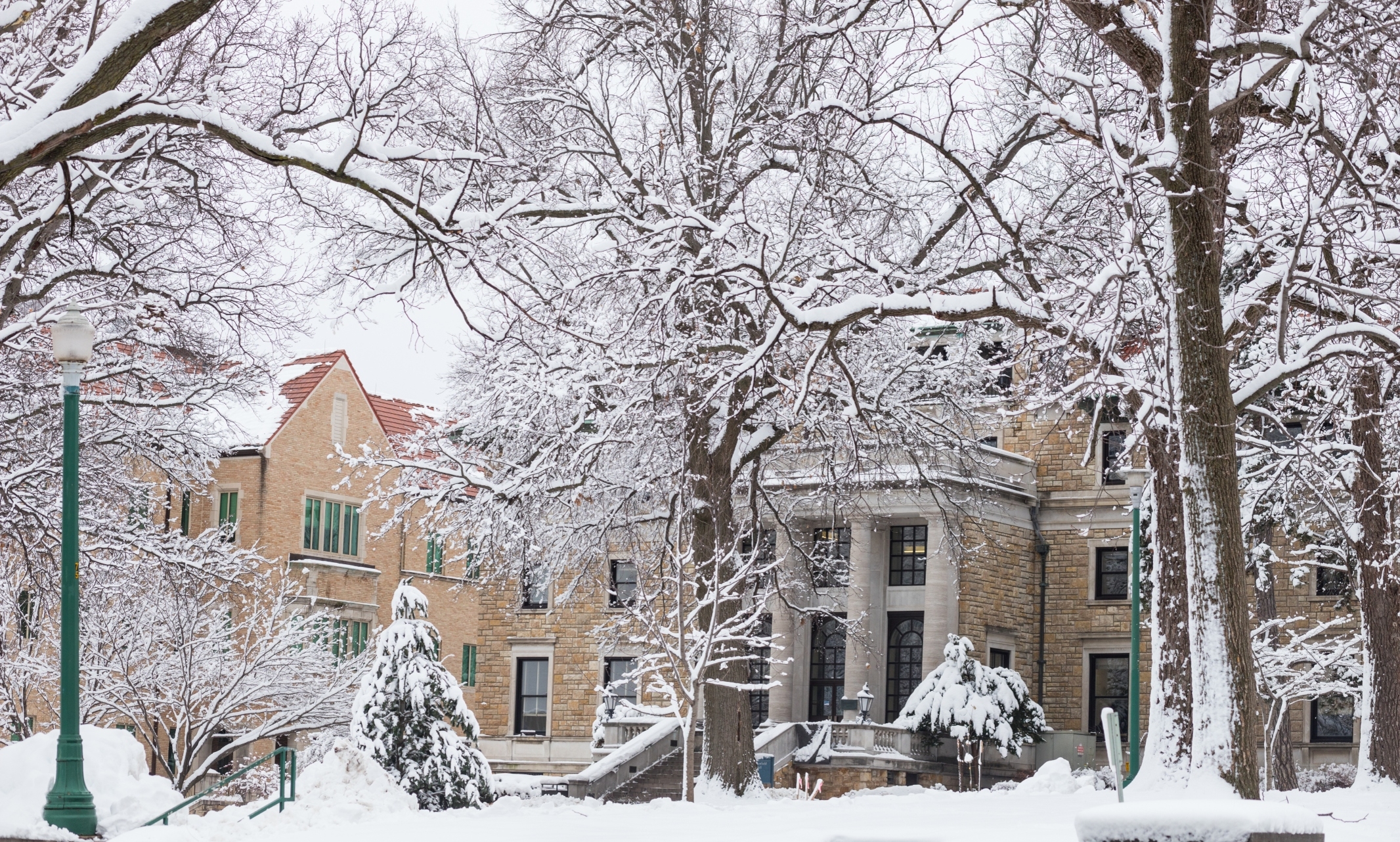
Here’s how to give
While the UMKC campus is closed during Winter Break, it’s still easy to make a year-end gift by observing the following guidelines.
UMKC offices will be closed Friday, Dec. 24 through Friday, Dec. 31. All gifts must hit UMKC Foundation accounts by Dec. 31 to receive tax credit for the 2021 calendar year. Checks and cash need to be postmarked on or before Dec. 31.
Credit card and stock gifts must hit the UMKC Foundation accounts by Dec. 31 to receive tax-credit for the 2021 calendar year. Checks and cash need to be postmarked on or before Dec. 31
The date UMKC receives and processes checks and cash from the mail has NO impact on a donor’s taxable year contributions. The “gift date” for the IRS is the date the donor relinquished control, not the date the gift is processed.
Availability and Contacts
The Office of Gift Processing will be available Thursday, Dec. 30 from 8 a.m. to noon to accept year-end gifts. The Office of Gift Processing will be closed on December 31 through the remainder of winter break and will re-open with regular business hours on Monday, Jan. 4.
The UMKC Foundation Office will be closed during winter break. Should you have any inquiries during that time, please call 816-235-5778 and someone will return your call.
For any stock gifts or wire transfers, please contact UMKC Foundation Accounting at umkcfoundationaccouting@umkc.edu.
Inquiries about all other year-end gifts can be directed to Sara Hampton at 816-235-5329 or via email to umkcgiftprocessing@umkc.edu. The Office of Gift Processing will also be taking calls at 816-235-1566 during the office hours listed above.
Gift Timing
Checks must be in an envelope postmarked prior to Dec. 31, 2021 to be credited in the 2021 tax year. If the envelope received is postmarked after Dec. 31, it will be counted as a 2022 gift. Donors should send their checks to the address below:
UMKC Office of Gift Processing 112 Administrative Center 5115 Oak Street Kansas City, MO 64112
Checks dated prior to Dec. 31, along with postmarked envelopes, should be received in the Office of Gift Processing on or before Friday, Jan. 7, 2021. Gifts received after that point will not be automatically included in processing for the annual tax receipt.
For stock gifts or wire transfers, please contact Tracie Rodriquez at tar9pn@umkc.edu for the transfer form and DTC instructions. Stock gifts must be received into the account on or before Dec. 31 in order to be reflected in 2021 tax period, per the IRS.
In order to liquidate the stock gift, it is required to provide the donor’s name, number of shares, security, expected date of transfer and area for where the gift is intended. This information can be completed on the transfer form or sent via email. Stock gifts will not be liquidated until confirmation of this information is received.
Mutual funds take an additional 3-5+ business days before posting to our account. Please advise your donors to have their brokers initiate any mutual fund transfers no later than Dec. 21. Regular equity stock takes 24 hours to post to our account.
Credit card transactions must be received by the Office of Gift Processing by 5 p.m. Dec. 31 to be reflected as a year-end gift. Credit cards may be called into the Office of Gift Processing on Dec. 30 from 10 am to 2 pm at 816-235-1566 or the form may be hand-delivered. On December 31, credit cards can ONLY be called in to 816-235-5329.
Credit card gifts may be made online through the UMKC Foundation website until midnight on Dec. 31 to be reflected as a 2021 gift. Any online credit card gifts received after midnight Dec. 31 will be dated in January.
Gifts received after hours may be deposited in the night deposit box located beside the Cashiers Office at the Administration Center lobby and will be processed the following business day. Credit card gifts received through the lockbox will be dated the following business day. Credit card forms dropped off on December 30 after 2 PM will not be processed until January 3, 2022.
Giving 2022 Information
Dec 08, 2021
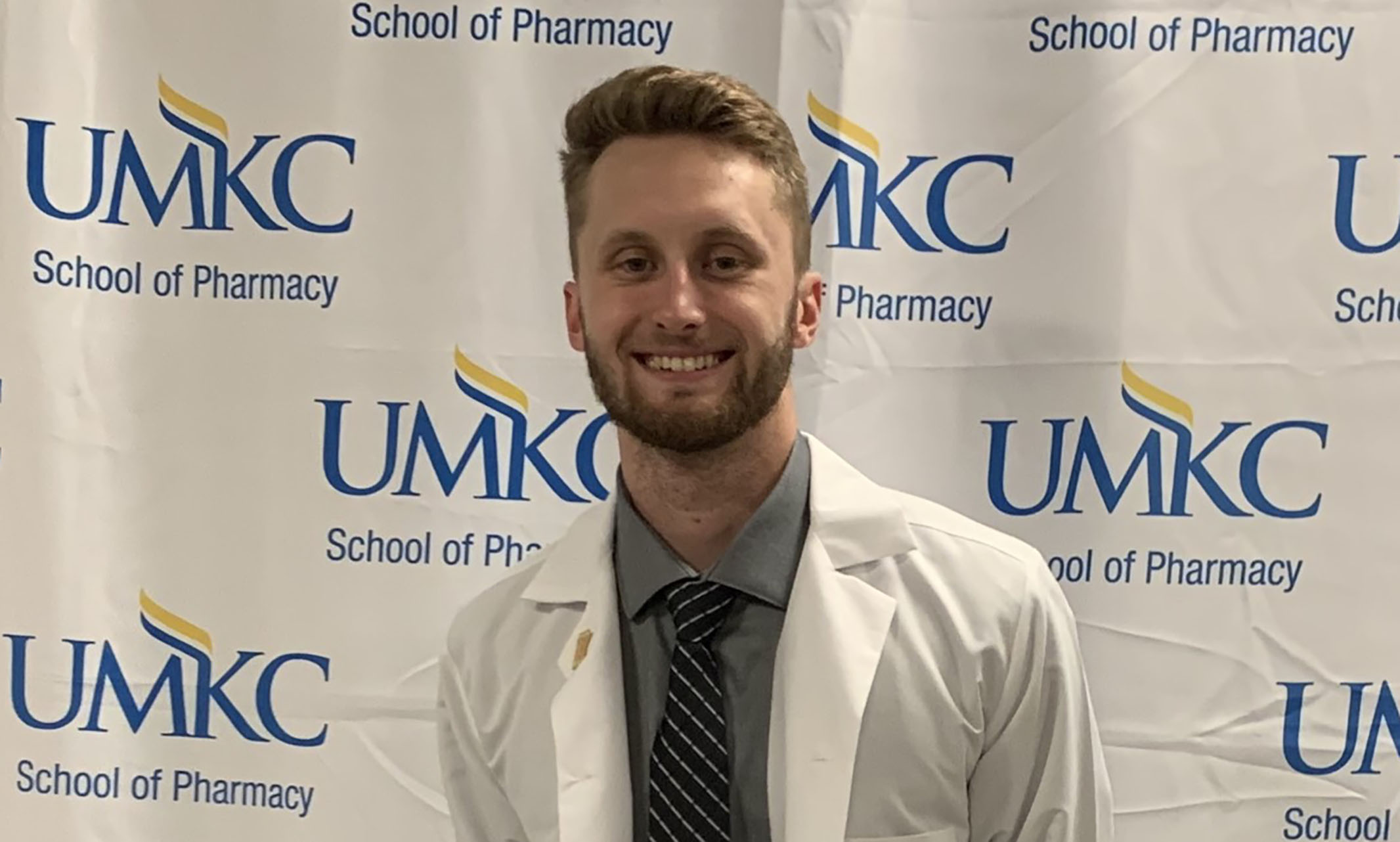
School of Pharmacy student's resume of success, leadership stands out
Brady Smith was still in middle school when he felt the tug of his career calling. It started with a job shadowing opportunity at school. Following his pharmacist father seemed like a safe bet.
“Dad was the one I job shadowed because of the convenience,” Smith said. “And I figured out, hey, I really kind of like pharmacy. Pretty much from sixth grade on, I’ve known that I’ve wanted to go into the pharmacy field.”
Smith began working in his father’s community pharmacy in Neosho, Missouri, during his senior year of high school. His career path hasn’t veered much since.
Now a fourth-year pharmacy student at the UMKC School of Pharmacy’s Missouri State University campus in Springfield, he is an accomplished student, a mentor for younger students and an ambassador for the School of Pharmacy.
He’s also the Missouri Pharmacy Association’s Student of the Year. Presented annually, the award recognizes a pharmacy student for commitment to pharmacy and community, participation in pharmacy organizations and community involvement.
The award caught Smith off guard.
“I didn’t even know it was a thing. I was actually quite surprised,” Smith said. “I was very honored to receive the award.”
His resume made Smith a perfect candidate for the award.
Since moving to Springfield to attend college, he has spent the past four years working as a pharmacy intern at a local community pharmacy.
“It’s really the niche that I enjoy in pharmacy,” Smith said. “I've been working there since before I got into pharmacy school. I feel like that's kind of helped me through the pharmacy curriculum as well.”
Earlier this year, Smith took an elective course in business planning. He and three classmates teamed up to participate in the Community Pharmacist Association’s Student Business Plan Competition. Their plan was strong enough to place them in the top 10 in the national competition.
Smith points to his leadership experience as a highlight of his student career. He’s been a student liaison on local and national committees, while at the same time doing weekly tutoring sessions with third-year pharmacy students. He also serves as a student ambassador for the School of Pharmacy. It’s a big responsibility helping students on the Springfield campus get and stay connected to the school in Kansas City.
“You’re the face of the UMKC School of Pharmacy, welcoming new students, attending orientation and helping students transition into pharmacy school,” Smith said. “That role has a lot of responsibility and a lot of merit.”
Smith exemplifies the quality of students at the School of Pharmacy, said Paul Gubbins, Pharm.D., associate dean for the UMKC School of Pharmacy at Missouri State University.
“UMKC School of Pharmacy has the best student pharmacists,” Gubbins said. “They contribute much to their communities and our profession, which has been recognized time and time again at the national and state level. Being from the Springfield site, we are incredibly proud of Brady. He is someone who has demonstrated himself as a student leader since the day he started our program. In addition, he is passionate about our profession and thus, I have no doubt he will be an excellent pharmacist and accomplish much in his career. I will be excited to see his future achievements for many years to come.”
Smith is on track to graduate from pharmacy school next May. But he’s already looking at extending his academic career. Next up, he hopes, will be a residency to prepare him to work in ambulatory care or possibly academic pharmacy.
“It’s a one-year residency and they say that you get three years’ worth of teaching in that one year,” Smith said. “I’d love to get that additional knowledge and information before I get out there in the real world.”
Dec 08, 2021
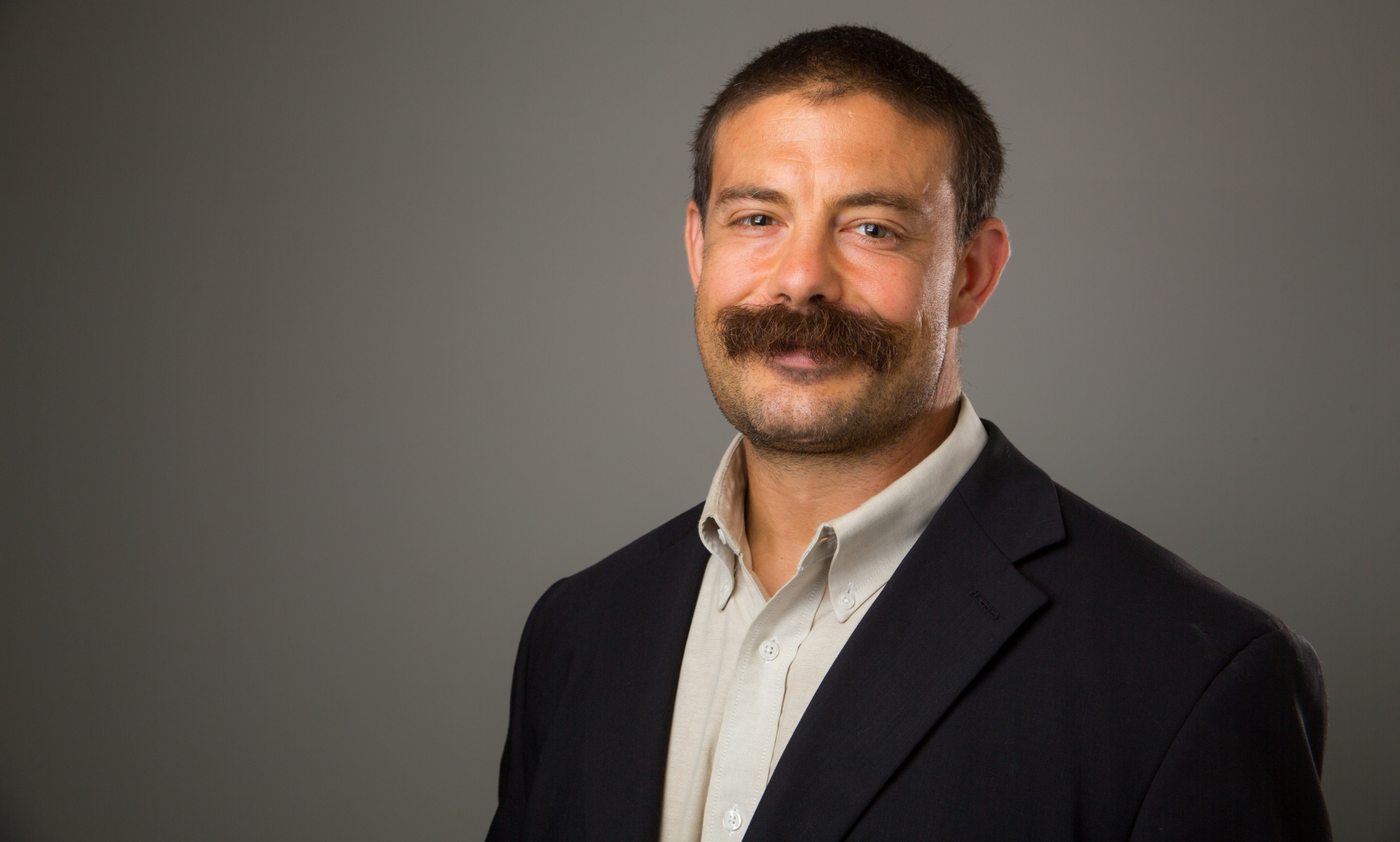
Anthony Caruso becomes the second UMKC faculty member in two years to earn prestigious fellowship
Anthony Caruso, a UMKC faculty member, has been named a Fellow of the National Academy of Inventors — the highest professional distinction awarded to academic inventors.
The NAI Fellows Program highlights academic inventors who have demonstrated a spirit of innovation in creating or facilitating outstanding inventions that have made a tangible impact on quality of life, economic development and the welfare of society.
Caruso's research team conceptualized, and for the first time, showed certain nuclear materials could be identified by their neutron emitting fingerprint. His team has also developed methods for making nuclear batteries, new techniques to generate and radiate high power microwaves for electronic attack and materials that reduce the size of computer chips.
"Receiving this honor means that our team was able to collectively execute on technology that is deemed new, novel and useful," Caruso said. "Coming together as a team is important and should be held in high regard."
Caruso wears many hats at UMKC, serving as professor in the College of Arts and Sciences and School of Computing and Engineering as well as the Associate Vice Chancellor of Research.
Beyond the university, he is highly regarded as a national expert in atomic physics and has a long-standing record of federal research support from the Department of Defense, specifically the Office of Naval Research and Defense Threat Reduction Agency. Caurso is also among a team of researchers at the Missouri Institute for Defense Engery.
"As our team forges ahead, we hope to make major changes in the affordability of whole foods, through urban horticultural engineering, and, in education, through platforms that can adapt the individual and their learning style to enrich and accelerate the information they ingest, retain and use to solve the wicked problems of tomorrow, Caruso said.
UMKC Chancellor C. Mauli Agrawal nominated Caruso for the fellowship. Upon finding out he had been named, Caruso said his first reaction was, "Chancellor Agrawal has my back."
"Tony's work is extraordinarily groundbreaking, and he has made a difference in the lives of many," Chancellor Agrawal said. "UMKC is proud to call him one of our own and is delighted to continue supporting him in his future endeavors."
Caruso is the second UMKC faculty member in the last five years to be named a Fellow of the NAI. Last year, Reza Derakhshani, professor in the School of Computing and Engineering and developer of a biometric technology that makes the eye the only password needed to secure smartphone and mobile devices, received the honor.
The 116-member 2021 Class of Fellows of the National Academy of Inventors will be inducted at the NAI 11th annual meeting in June 2022. The National Academy of Inventors is a member organization comprised of U.S. and international universities and governmental and nonprofit research institutions with more than 4,000 individual inventor members and Fellows spanning more than 250 institutions worldwide.
The NAI was founded in 2010 to recognize and encourage inventors with patents issued from the U.S. Patent and Trademark Office, enhance the visibility of academic technology and innovation, encourage the disclosure of intellectual property, educate and mentor innovated students and translate the inventions of its members to benefit society.
Collectively, NAI Fellows hold more than 42,700 issued U.S. patents, which have generated over 13,000 licensed technologies, 3,200 companies and created more than one million jobs.
Dec 07, 2021
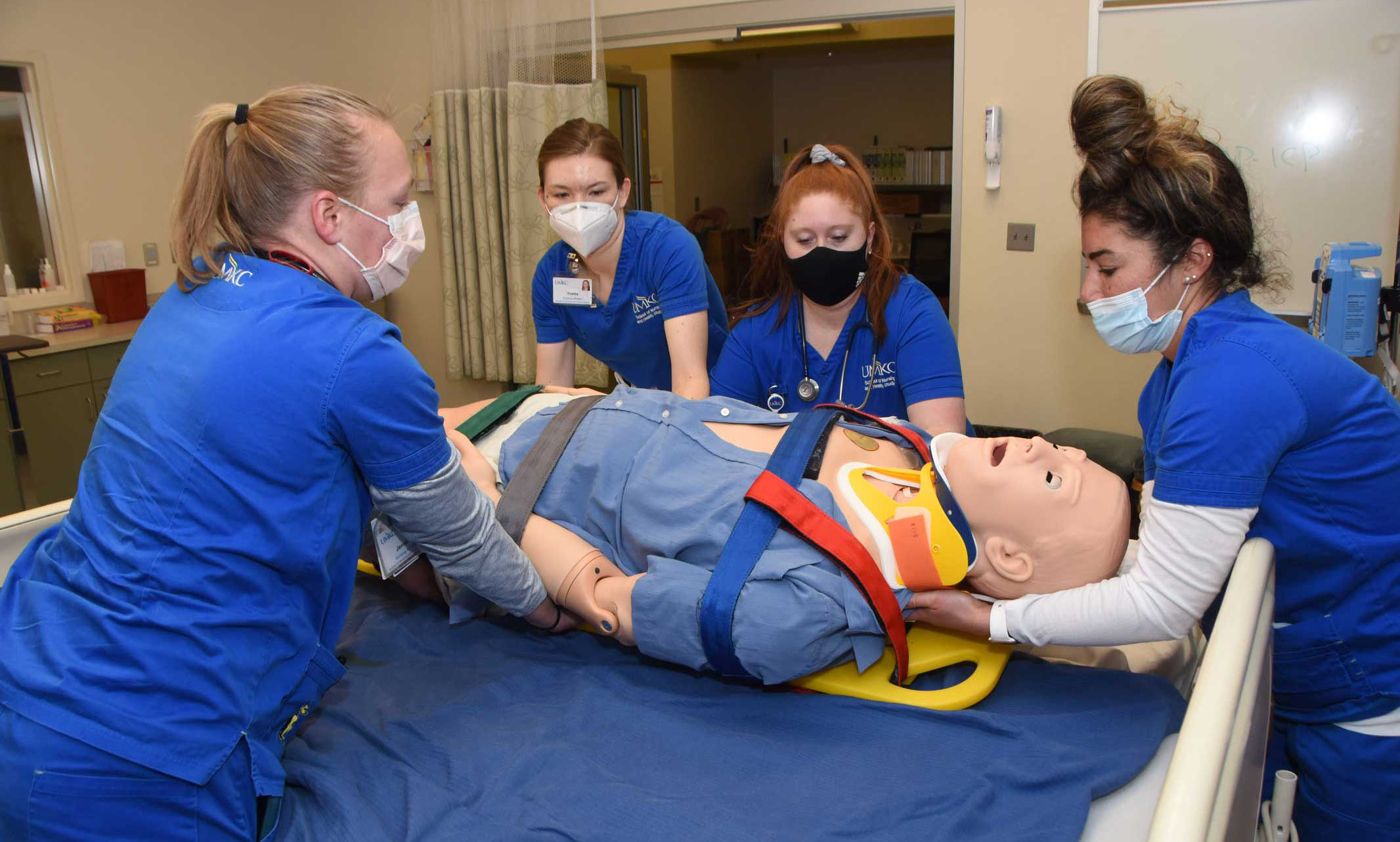
Nursing enrollment and applications increase in response to pandemic
The global pandemic directed a spotlight on many important roles within the health care profession. From contact tracers to frontline nurses to emergency room doctors, COVID has pushed health care careers to the fore front, particularly nursing.
For those in health care higher education, the question is how that attention affects the plans of future college students. Does it ignite an interest in health care or upend prospective students’ best-laid plans?
The answer is taking focus with recent data from the American Association of Colleges of Nursing. Nationally, enrollment is up 5.6% for baccalaureate, master’s and doctoral nursing programs. According to UMKC’s Joy Roberts, the UMKC School of Nursing and Health Studies is seeing a similar trend – but doubled.
“We saw undergrad applications jump by ten percent,” said Roberts, interim dean. “These prospective students were seeing the agony in their communities, in cities, and they wanted to help.”
Further proof for Roberts is the attendance she’s seen at UMKC’s First Semester Experience classes that focus on nursing. The university offers various courses designed for new students to explore the various career paths available at UMKC. Nursing offered two dates of its class, Thrills, Chills and Eeewww! Adventures in Nursing. Both proved popular with new students.
“We’ve had standing room only at our sessions,” said Roberts. “A lot of times, the students had never even thought about it – never even thought about going into nursing – until it was suddenly forced in the public eye because of the pandemic.”
At the UMKC School of Nursing and Health Studies, there are different academic paths to earning a nursing degree, as well as a degree in health sciences with minors in public health and exercise science.
Dec 02, 2021
